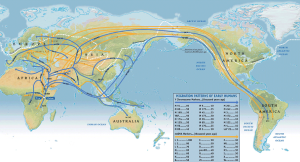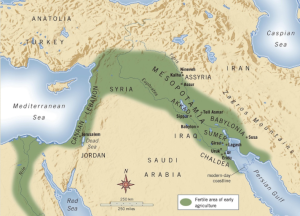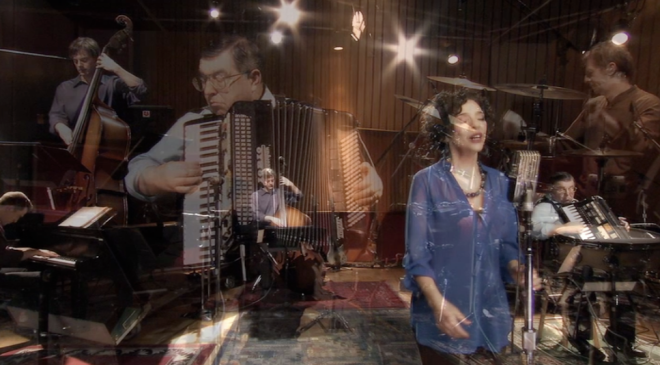Nomad Notes
Nomad Notes 2023
Posted in Uncategorized
Tagged cultural diplomacy, cultural exchange, Lisbon, live music, Paris, Rome, Zurich
NOMAD NOTES – Chapter 5 –Victory is Thriving in Spite of It
NOMAD NOTES – Chapter 5 –Victory is Thriving in Spite of It, on the bus from Vilnius, Lithuania to Warsaw, Poland, September 1, 2016
I’m up since before dawn, way before my 7:00 am iPhone alarm, with my mind rolling. I’m on an 8-hour bus ride from Vilnius to Warsaw, at a fraction of the price of flying. The driver is capable of asking for your passport in Lithuanian, Russian, English, and heaven knows what other language.
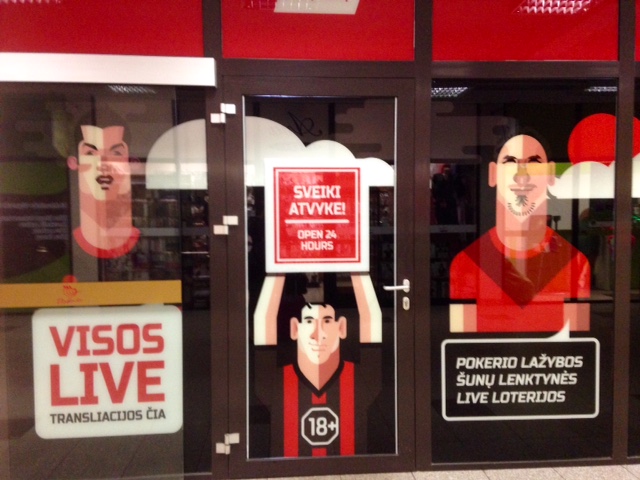 The grim bizarreness of the bus station reminds me that I am in a city that is still recuperating from the Soviet era. Not so far away deluxe shops sell Italian bags to tourists paying with Euros; Lithuania just switched its currency to the Euro last year.
The grim bizarreness of the bus station reminds me that I am in a city that is still recuperating from the Soviet era. Not so far away deluxe shops sell Italian bags to tourists paying with Euros; Lithuania just switched its currency to the Euro last year.
But here in the bus station my shocking failure to learn even the most minimal language is impacting my ability to find food I can eat on the bus. EVERYTHING is surrounded by a nice, glutinous roll, I don’t know the word for eggs or how to form a sentence, and I manage to buy an apple and a banana for the trip.
I survive getting stuck – together with my luggage – in a floor-to-ceiling turnstyle (think NYC subways) trying to get into the probable last bathroom on land. I’m out of change (what, you want a FREE bathroom??), can’t get out or in, and I’m saved by yet another compassionate young woman. Thank you, Universe.
At this point, my wallet is full of receipts, my bank account is close to empty, my emotional tank is full, and I’m flying back to New York tomorrow.
I’ve just been told that the bus I’m on will not be stopping at the stop I booked for, Warsaw Central, where I’ve purposely booked my last hotel. I’ve been offered a Metro ticket to get to my destination. Why? This is unacceptable. Traffic is impacting the schedule. Oh, I see. Thanks a lot.
I think back over the last two weeks. It’s incredible that I flew to Israel on August 14; was that just 2 weeks ago? It feels like a lifetime. I’ve cried buckets of tears and learned how much I don’t know, like most of the history of my own people.
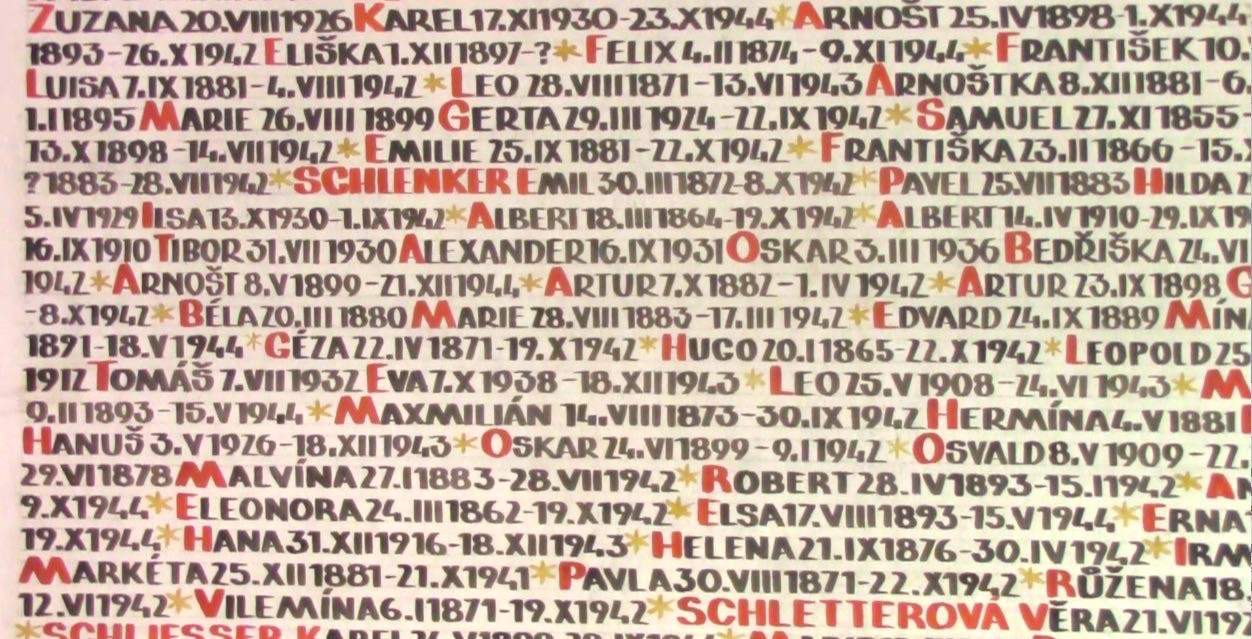 The Pinkas Synagogue is the second oldest surviving synagogue in Prague. It commemorates about 78,000 Czech and Moravian Jewish victims of the Holocaust. The floor of the synagogue is below ground level, so it has been repeatedly afflicted by floods and moisture. From 1955-60, the walls of the synagogue were inscribed in tribute with names of about 78,000 victims. The synagogue was closed after less than a decade, in 1968, with the Soviet occupation of Czechoslovakia. After the Soviets were ousted in 1989, the synagogue was reconstructed for three years and then opened to public, but it took another three years to restore the inscriptions of the names on the walls that were damaged by moisture (or whatever). In 2002, an old enemy of the synagogue, flood, proved its power and the inscriptions had to be restored again. You cannot begin to imagine the immensity of this task; walls and walls and walls, floor to ceiling. Restored again and again. By hand, dauntlessly. So that the dead who had no graves would not be forgotten.
The Pinkas Synagogue is the second oldest surviving synagogue in Prague. It commemorates about 78,000 Czech and Moravian Jewish victims of the Holocaust. The floor of the synagogue is below ground level, so it has been repeatedly afflicted by floods and moisture. From 1955-60, the walls of the synagogue were inscribed in tribute with names of about 78,000 victims. The synagogue was closed after less than a decade, in 1968, with the Soviet occupation of Czechoslovakia. After the Soviets were ousted in 1989, the synagogue was reconstructed for three years and then opened to public, but it took another three years to restore the inscriptions of the names on the walls that were damaged by moisture (or whatever). In 2002, an old enemy of the synagogue, flood, proved its power and the inscriptions had to be restored again. You cannot begin to imagine the immensity of this task; walls and walls and walls, floor to ceiling. Restored again and again. By hand, dauntlessly. So that the dead who had no graves would not be forgotten.
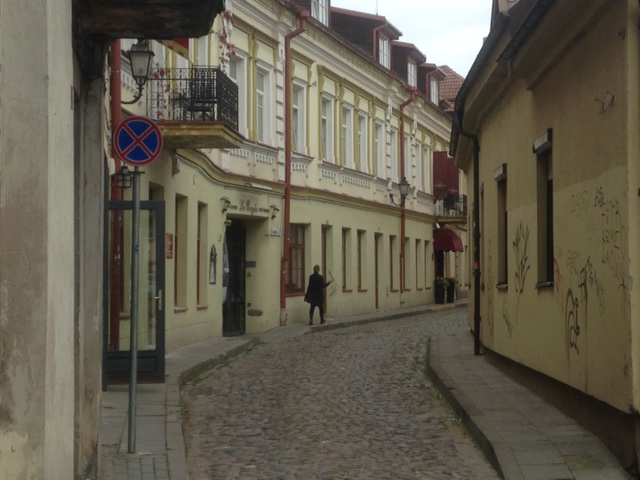 Vilnius is referred to as the Jerusalem of Lithuania. It was a center of Jewish learning, and was near the little town where my Grandfather was born and where other family members lived. While the Russian Czar was still in power, my branch of the family immigrated to New York City, in two groups, around 1900. First the father and the oldest sons (among them Morris, my Grandfather), then the mother with the youngest kids. Some other relatives immigrated as well.
Vilnius is referred to as the Jerusalem of Lithuania. It was a center of Jewish learning, and was near the little town where my Grandfather was born and where other family members lived. While the Russian Czar was still in power, my branch of the family immigrated to New York City, in two groups, around 1900. First the father and the oldest sons (among them Morris, my Grandfather), then the mother with the youngest kids. Some other relatives immigrated as well.
Those family members who remained, along with almost all their descendants, were killed by the Nazis on the notorious night of November 25, 1944.
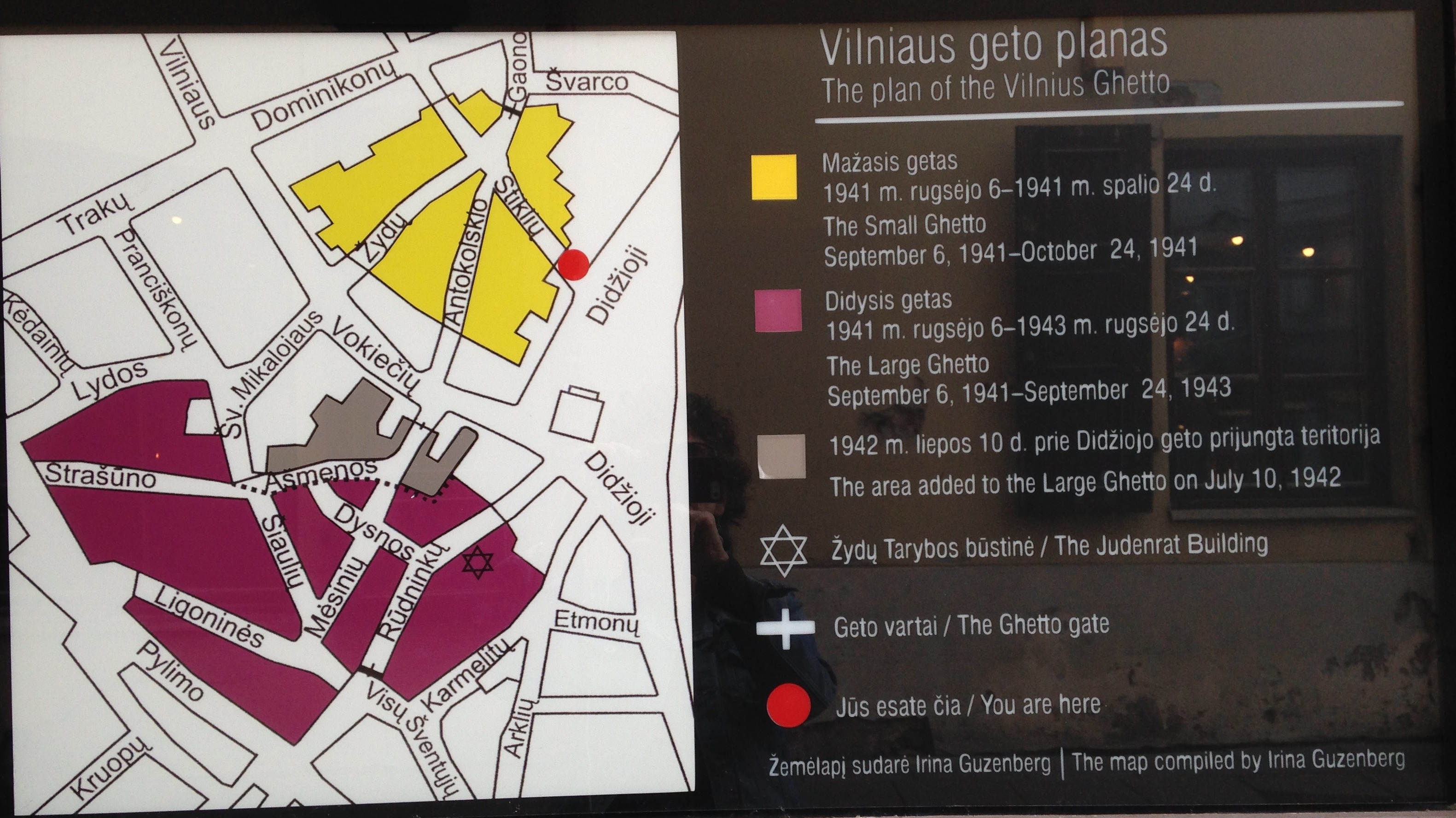 I arrived in Vilnius from Prague by Air Baltic propeller plane, after some nerves but in good shape. A dear friend (and percussionist in my band) put me in touch with an American violinist who had been living in Vilnius for the last 3 years, and by a stroke of luck we were able to connect. Karen was a fountain of information and good advice and she gave me the tour of the Jewish ghetto.
I arrived in Vilnius from Prague by Air Baltic propeller plane, after some nerves but in good shape. A dear friend (and percussionist in my band) put me in touch with an American violinist who had been living in Vilnius for the last 3 years, and by a stroke of luck we were able to connect. Karen was a fountain of information and good advice and she gave me the tour of the Jewish ghetto.
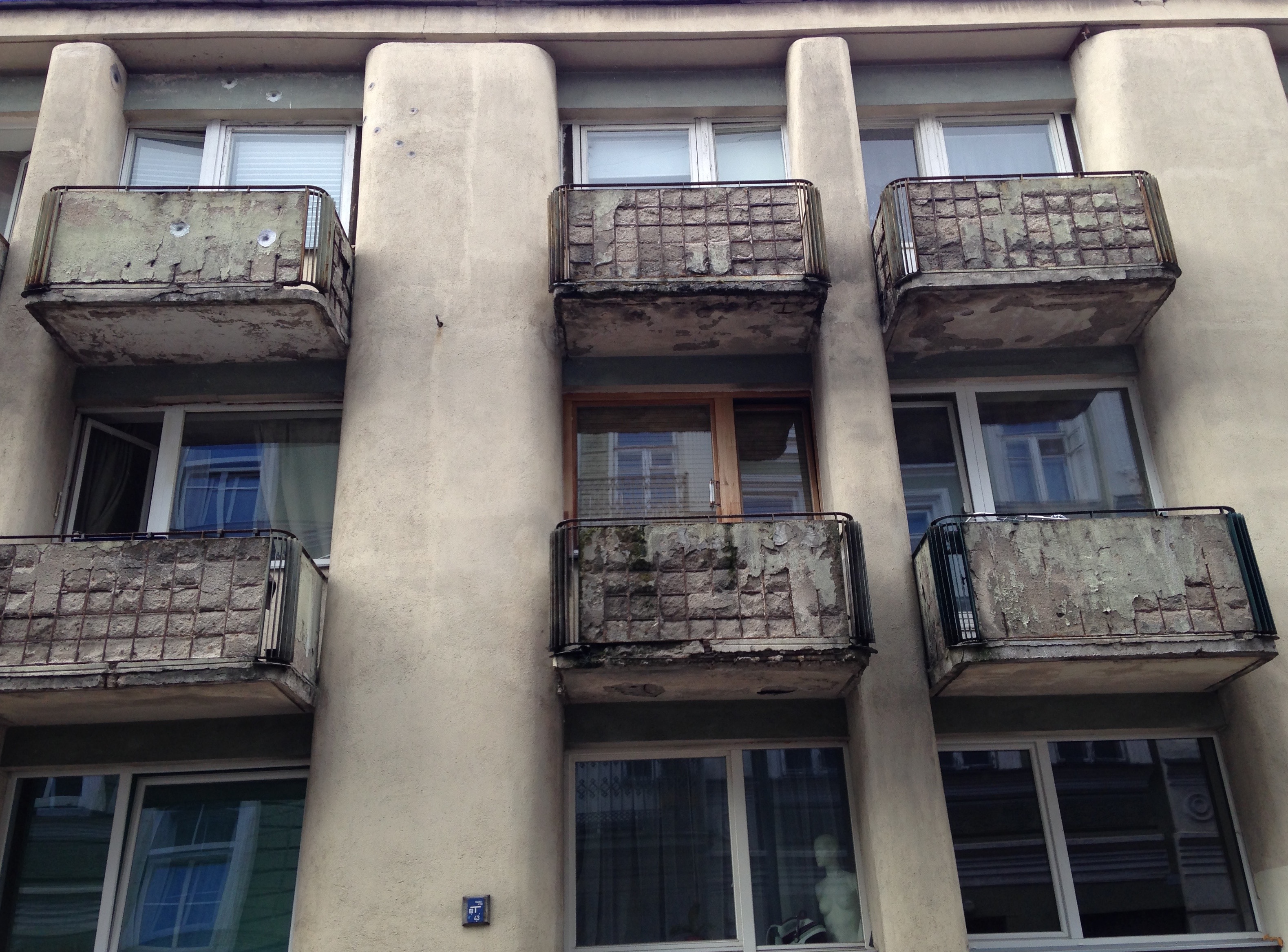 But what ghetto? In Krakow, I had walked into the square and cried with the recognition that I had come home. The restaurants serving Jewish specialties accompanied by live Klezmer music; perhaps it had been diminished by the Holocaust but it was still there.
But what ghetto? In Krakow, I had walked into the square and cried with the recognition that I had come home. The restaurants serving Jewish specialties accompanied by live Klezmer music; perhaps it had been diminished by the Holocaust but it was still there.
In Vilnius, there was no center. There was no “there” there.
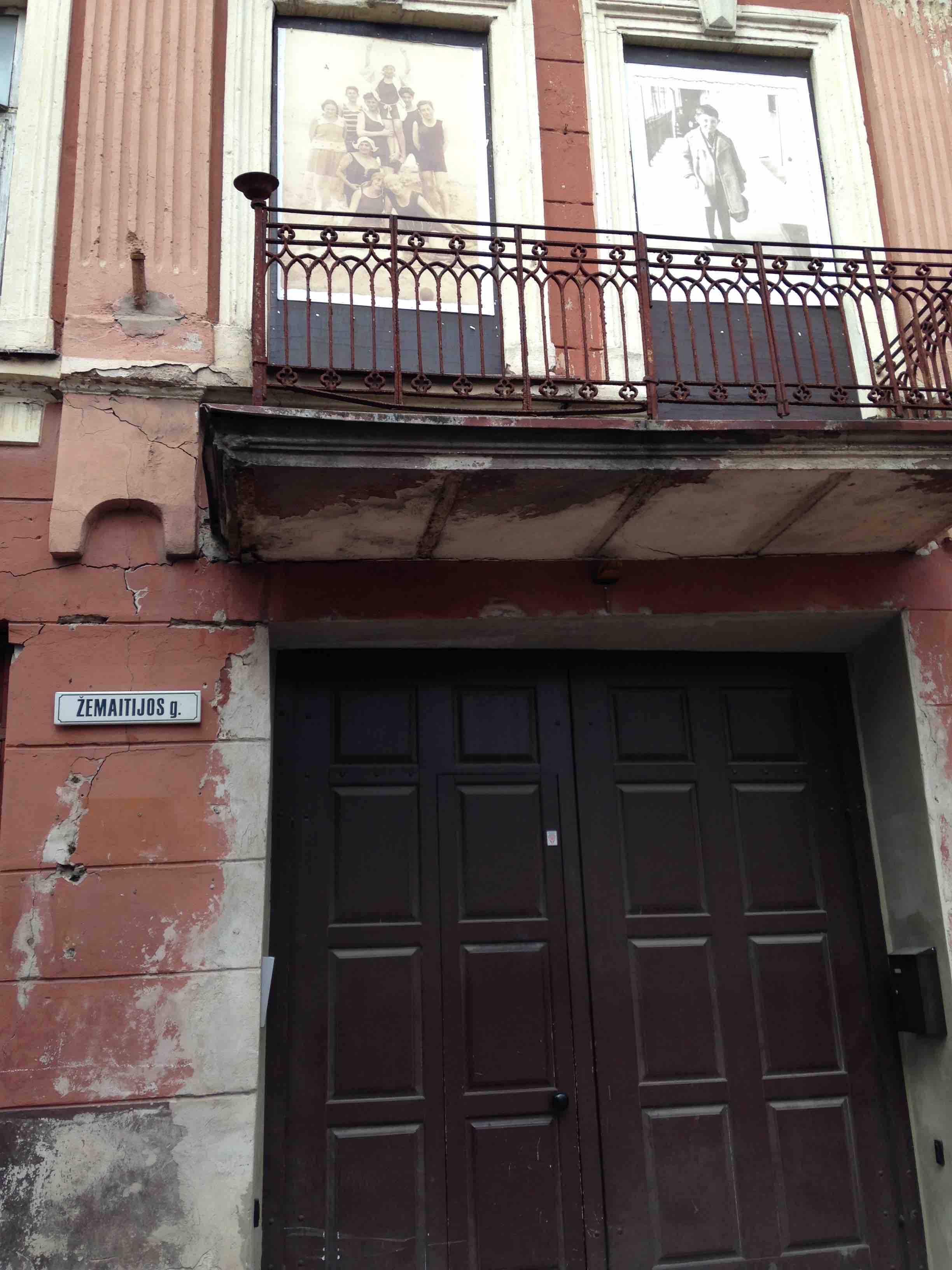 This great center of Jewish learning, of commerce and trade, where did it go? It disappeared, first under the Nazis and then under the Soviets. The market place, where the Jewish community engaged in vibrant commerce is now a little park in the middle of a road.
This great center of Jewish learning, of commerce and trade, where did it go? It disappeared, first under the Nazis and then under the Soviets. The market place, where the Jewish community engaged in vibrant commerce is now a little park in the middle of a road.
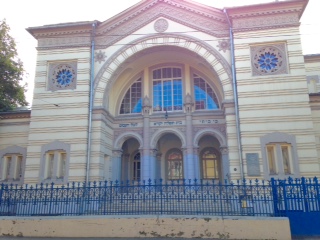 Before World War II, there were 100 synagogues in Vilnius; now only one remains, known as The Choral Synagogue.
Before World War II, there were 100 synagogues in Vilnius; now only one remains, known as The Choral Synagogue.
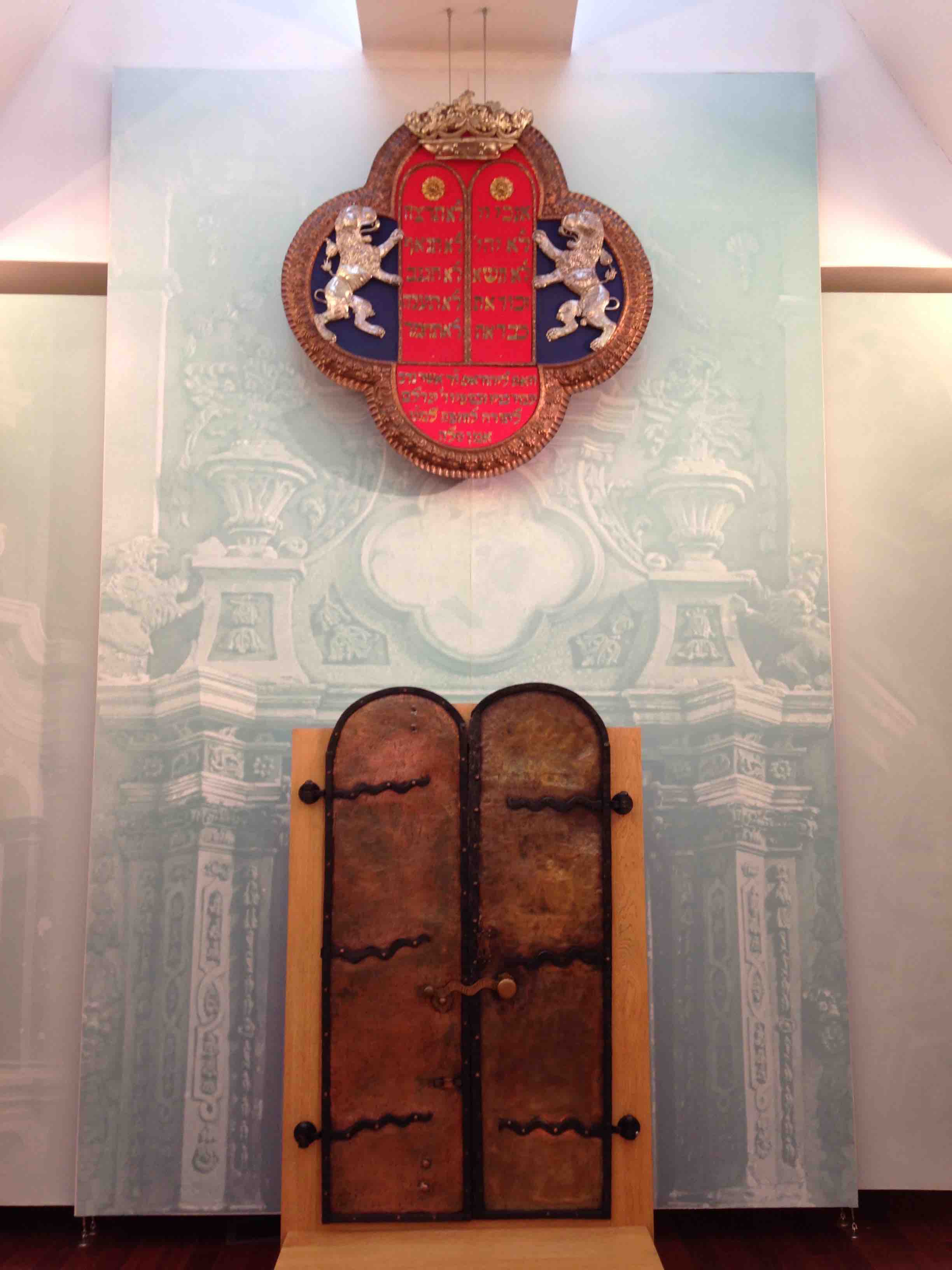 The main synagogue was destroyed by the Russians in the 1950’s and only these relics remain, housed lovingly in the Vilna Gaon Jewish State Museum’s Tolerance Museum.
The main synagogue was destroyed by the Russians in the 1950’s and only these relics remain, housed lovingly in the Vilna Gaon Jewish State Museum’s Tolerance Museum.
On the plot of land where the 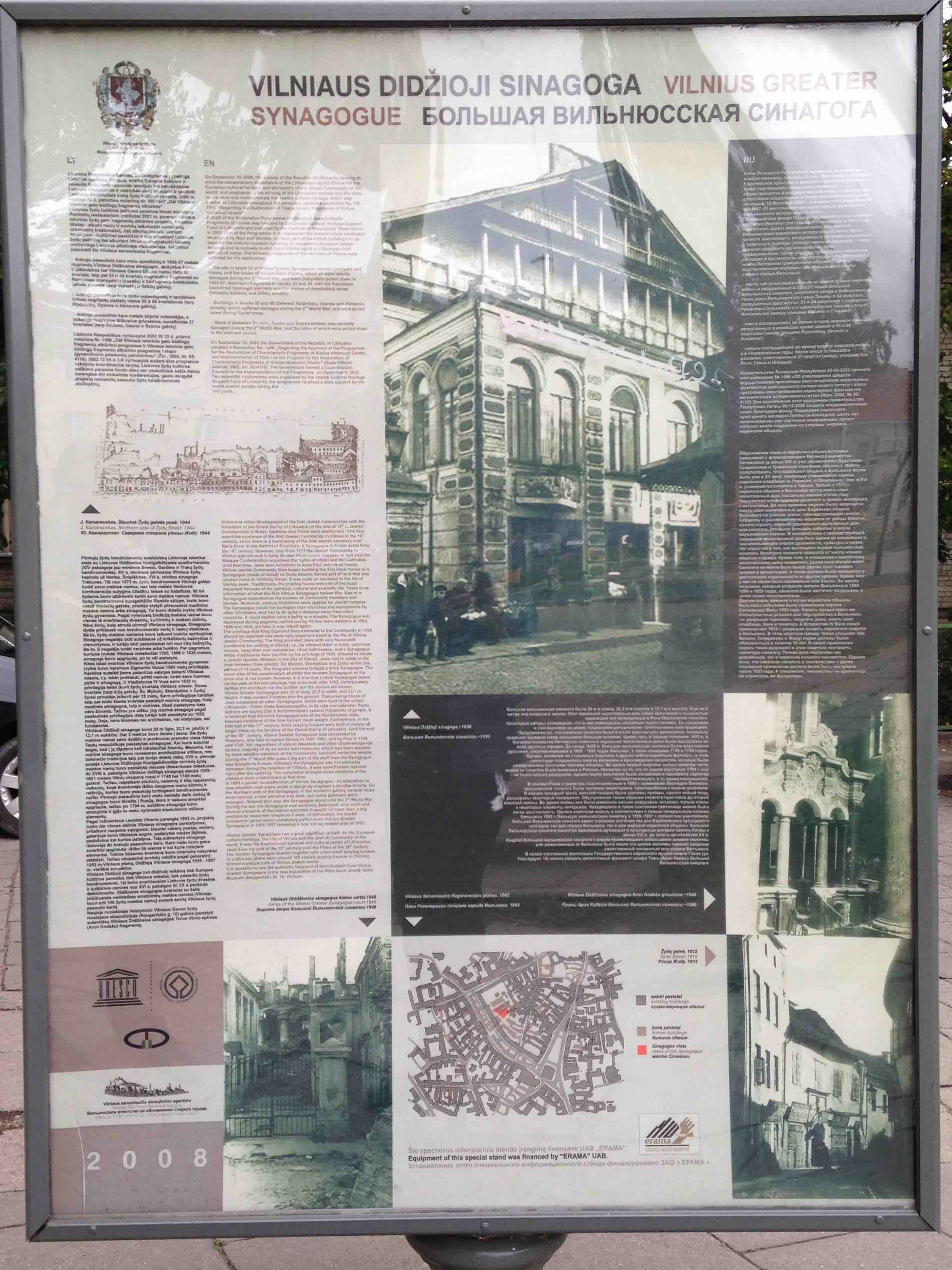 main synagogue stood, there now stands an elementary school, all trace of it gone. Just a poster, showing where it was, a photo, a description.
main synagogue stood, there now stands an elementary school, all trace of it gone. Just a poster, showing where it was, a photo, a description.
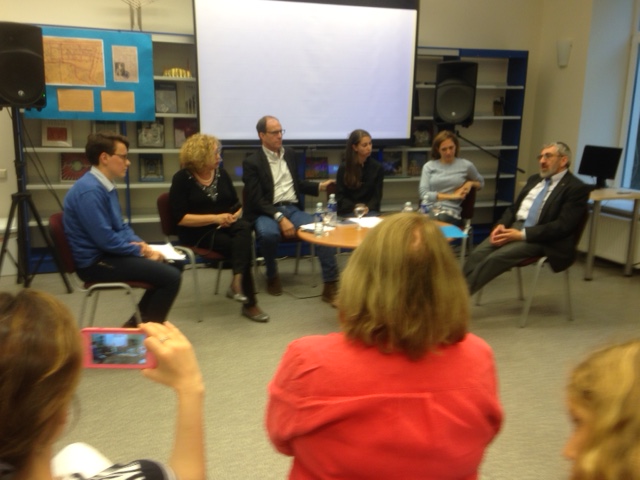 I had the good fortune to arrive during the 75th commemoration of the Holocaust, and Karen brought me to a memorable event at the Vilnius Jewish Public Library, one of several that had taken place this week. Family members of victims and survivors (who now live in Israel, the USA, and the UK) spoke eloquently about those who perished, disappeared, or underwent great hardship and cruelty. Commemorative plates have now been embedded in the streets of the ghetto to honor members of the Jewish community.
I had the good fortune to arrive during the 75th commemoration of the Holocaust, and Karen brought me to a memorable event at the Vilnius Jewish Public Library, one of several that had taken place this week. Family members of victims and survivors (who now live in Israel, the USA, and the UK) spoke eloquently about those who perished, disappeared, or underwent great hardship and cruelty. Commemorative plates have now been embedded in the streets of the ghetto to honor members of the Jewish community.
In speaking of their grandparents, they echoed some of my own experiences, acknowledging how difficult it is to find ancestors when the borders of countries changed every few years as a result of conquest. One could live in the very same town but one’s country of origin could change – what country are we living in today – is it Lithuania, Russia, Poland, Belarus?
They also noted a typical psychological phenomenon – that survivors cannot talk about their experiences to their children but feel the need to tell their grandchildren. Another reason that in many cases, the information about the past has gone to the grave with those who knew the stories.
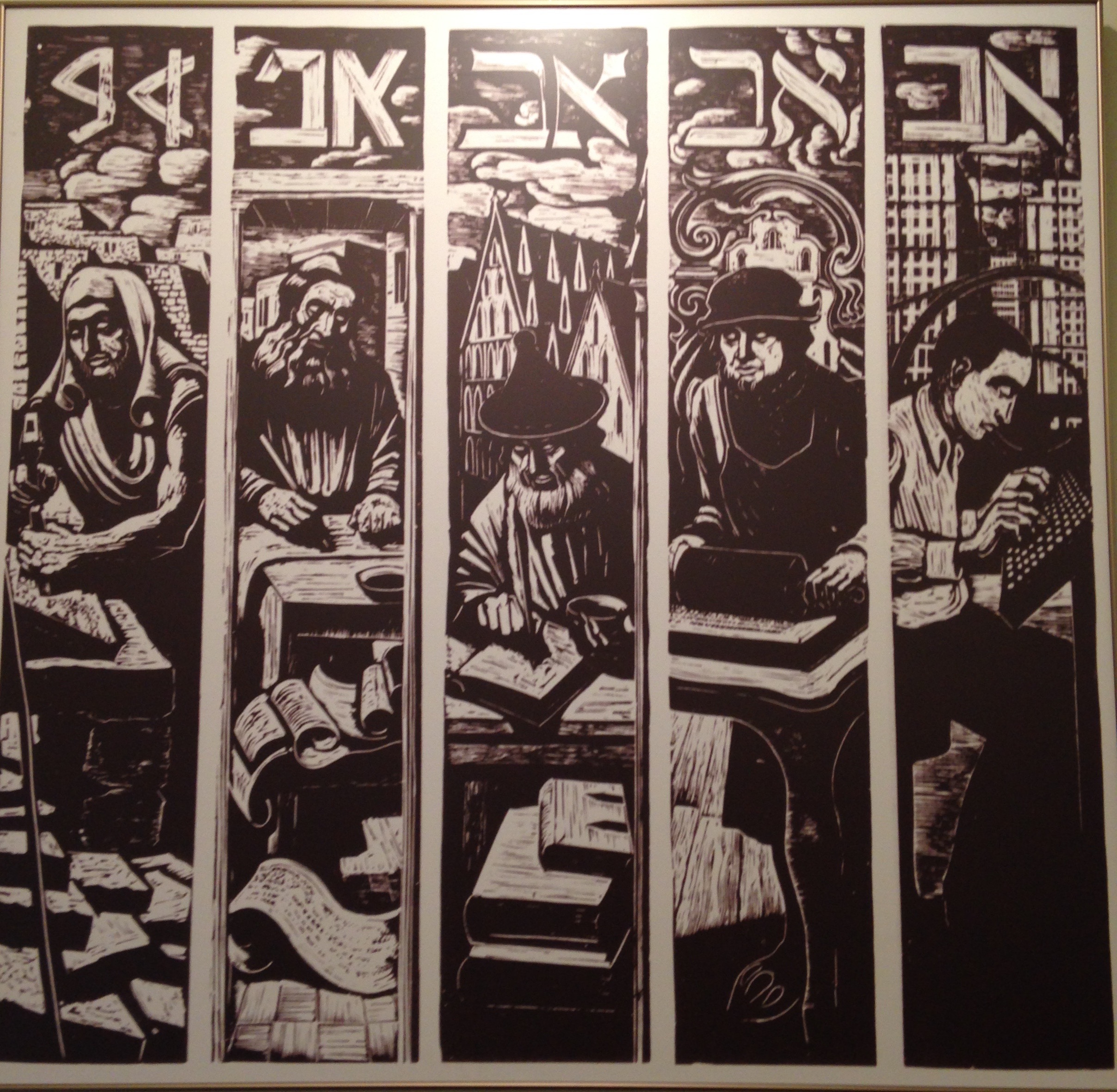
In all the accounts, not just of World War II, but also European history for centuries, I see the theme of the Jews being the educated ones, those useful to assist in transactions between those who could not read (future of the Jewish lawyer?). Jews were successful merchants, prosperous hard workers and responsible members of the community. For this we have been envied, hated, stigmatized and preyed upon. Why?
When asked how the present generation can help to repair the past, the family members justly said that the first step is knowledge – bringing the facts to light.
“Worse than hatred is indifference.” Those who stood by and allowed the Holocaust to happen showed their indifference. Or perhaps they were governed by their own fear of being punished for speaking out or taking action.
Perhaps the COURAGE to stand up for justice for all humanity is the primary quality we must cultivate in the present and instill in generations to come.
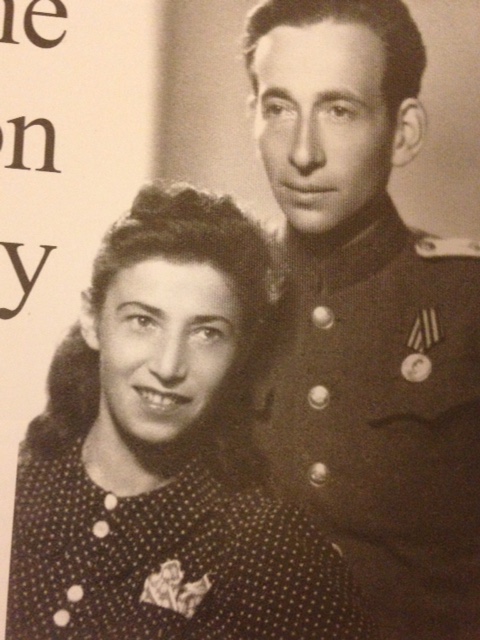 The last gift was when Karen introduced me to Judita Gliauberzonaite and her daughter.
The last gift was when Karen introduced me to Judita Gliauberzonaite and her daughter.
Judita’s grandfather, born in 1913 in Vilnius, looks like my father, born the same year in New York, son of Morris from Vilna.
Her grandmother looks like my cousin Barbara. Same side of the family.
Judita said exactly what I have been saying, “Because they lived I am here.” We hugged and cried, having known each other only minutes.
In DNA terms, a long-lost sister.
As the family members said, “The greatest victory is surviving and thriving in spite of what occurred.”
NOMAD NOTES – Chapter 4 – Looking It in the Eyes
NOMAD NOTES – Chapter 4 – Looking It in the Eyes, Prague, Czech Republic, August 28, 2016
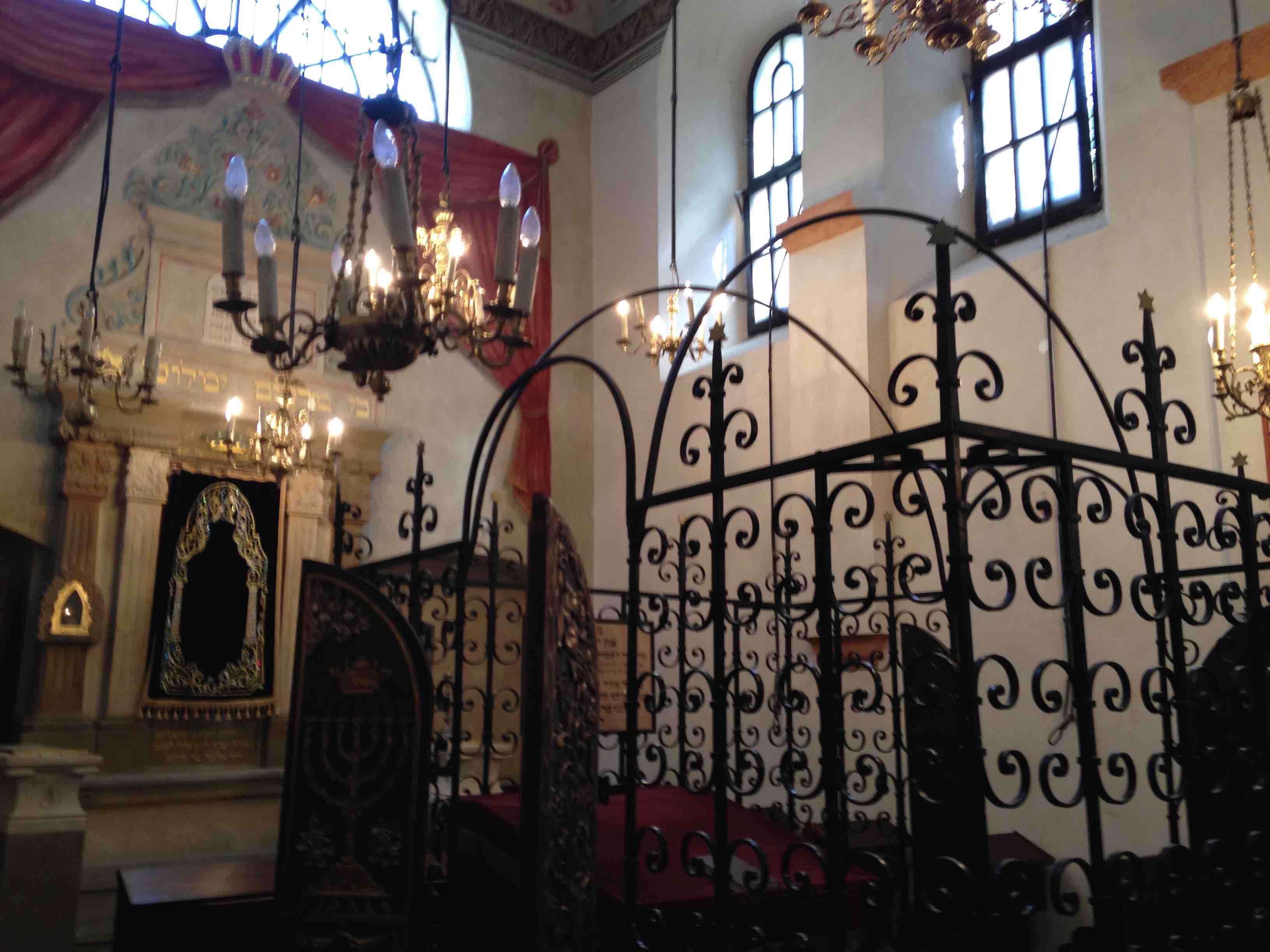 I’ve been trying to write this for a few days, since my experiences in the Jewish Quarter of Krakow, Poland, and my visit to the death camps at Auschwitz and Birkenau a few days ago. Today I will visit the Jewish Quarter here in beautiful Prague.
I’ve been trying to write this for a few days, since my experiences in the Jewish Quarter of Krakow, Poland, and my visit to the death camps at Auschwitz and Birkenau a few days ago. Today I will visit the Jewish Quarter here in beautiful Prague.
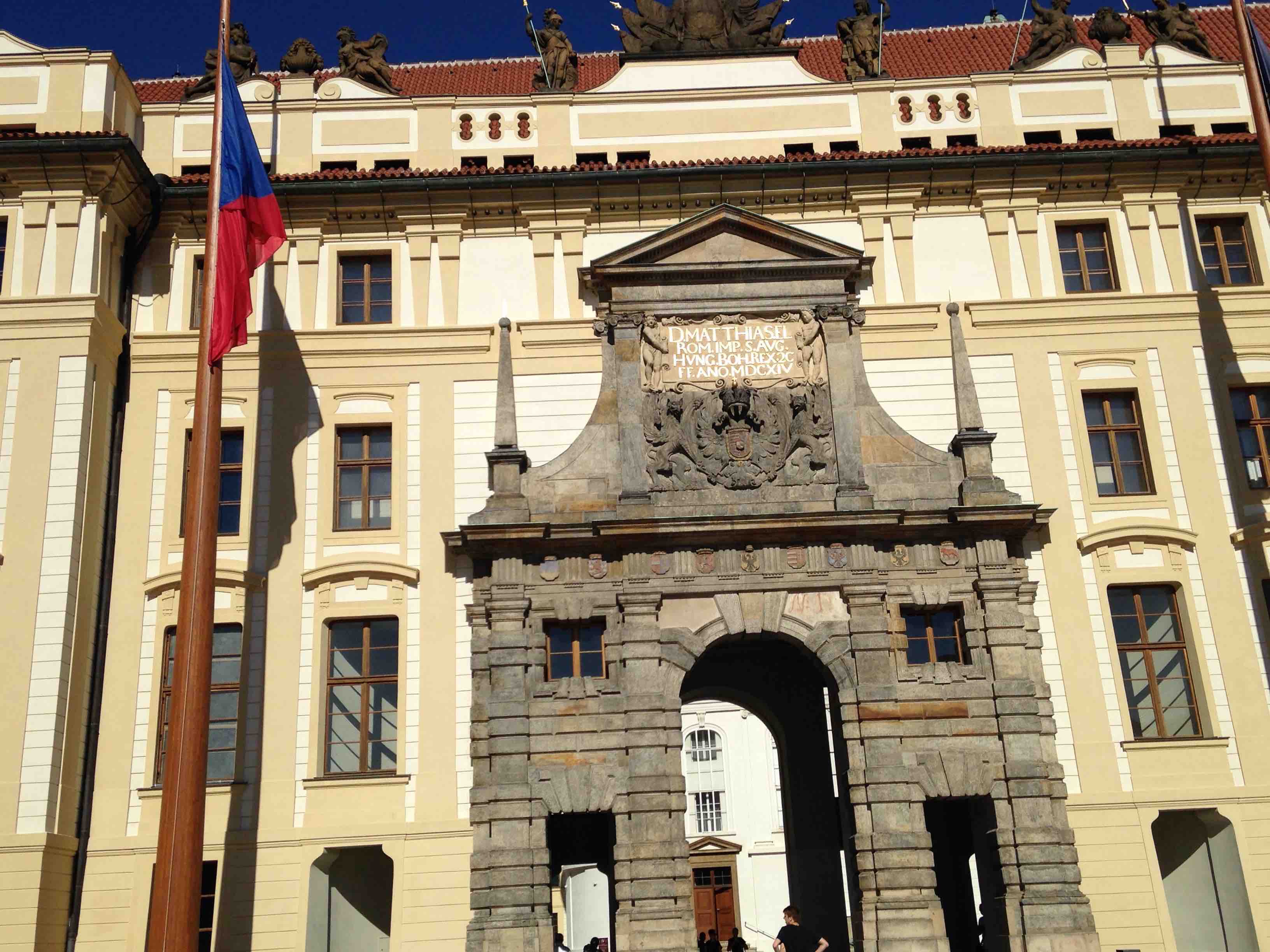 The Prague Castle compound is vast and gorgeous, and I sit here in my nearby apartment, hearing the early morning sounds of trams and cars, even on a Sunday.
The Prague Castle compound is vast and gorgeous, and I sit here in my nearby apartment, hearing the early morning sounds of trams and cars, even on a Sunday.
I take my freedom for granted.
I grew up in New York, where the Jewish population was at least 25% of the city, as it was in Krakow before the Nazis. Krakow is still considered a center of Jewish life in Europe, and as soon as you walk into the Kazimierz district, you can see it and hear it.
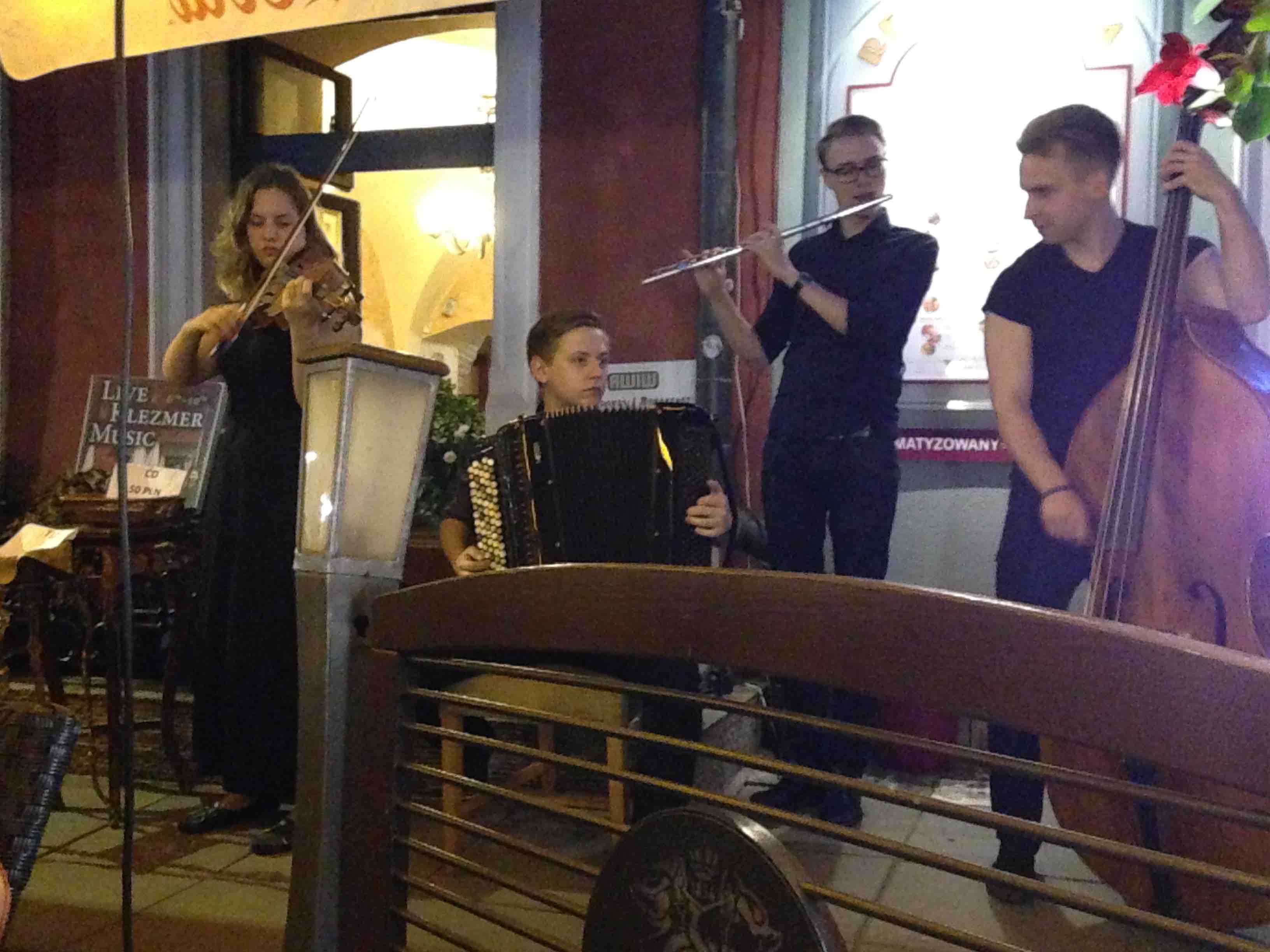 Sounds of live Klezmer music pervade the air, as I stroll the square, past shops and synagogues. Tourists fill the cafés, here to see the setting made famous in our time by Spielberg’s film, Schindler’s List.
Sounds of live Klezmer music pervade the air, as I stroll the square, past shops and synagogues. Tourists fill the cafés, here to see the setting made famous in our time by Spielberg’s film, Schindler’s List.
The restaurants offer Jewish specialties like Gefilte Fish, and others that my food allergies no longer permit me to eat, but whose taste I remember.
I feel immediately at home, and tears of recognition fill my eyes. I’ve travelled half the night and half the day to get here from Tel Aviv. I’ve come to the right place.
At home in the suburbs of New York where I grew up, dinner was always served at 6:00 pm. There was no TV on, it was always a full meal, and we talked, discussing different subjects important to the family, what I did in school, even our philosophy of life. I was always encouraged to freely express my views, even as a child. (I notice I’ve used the word ‘always’ three times. That’s how I remember it; that’s how it was.)
Culturally Jewish and a born Buddhist, I believed then (and still believe now) in the equality and essential goodness of all humans; in each person’s capacity to manifest that goodness. This was one of the topics of conversation at the dinner table. And it was a debated topic: Nature or Nurture, or both?
The obvious example, with World War II still pretty fresh in my parents’ minds, was Hitler. Could he possibly have been born innocent?
My parents didn’t want to force their views on me, but they refused to buy a Volkswagon or other German products. I maintained that you cannot blame today’s generation for the errors of the past, which I still believe. Then the day came, in 9th Grade Humanities Class, when I was shown the photographs of piled up bodies taken at the liberation of the camps. I still remember those photos as if it were yesterday; they changed my life.
Growing up Jewish in New York I was not aware of prejudice. Yes, I was a minority in class in my neighborhood, but Leonard Bernstein conducted the NY Philharmonic and the vibrant and prominent Jewish population seemed to define the city. Jews were an important and respected presence, probably like they were in Krakow before the war.
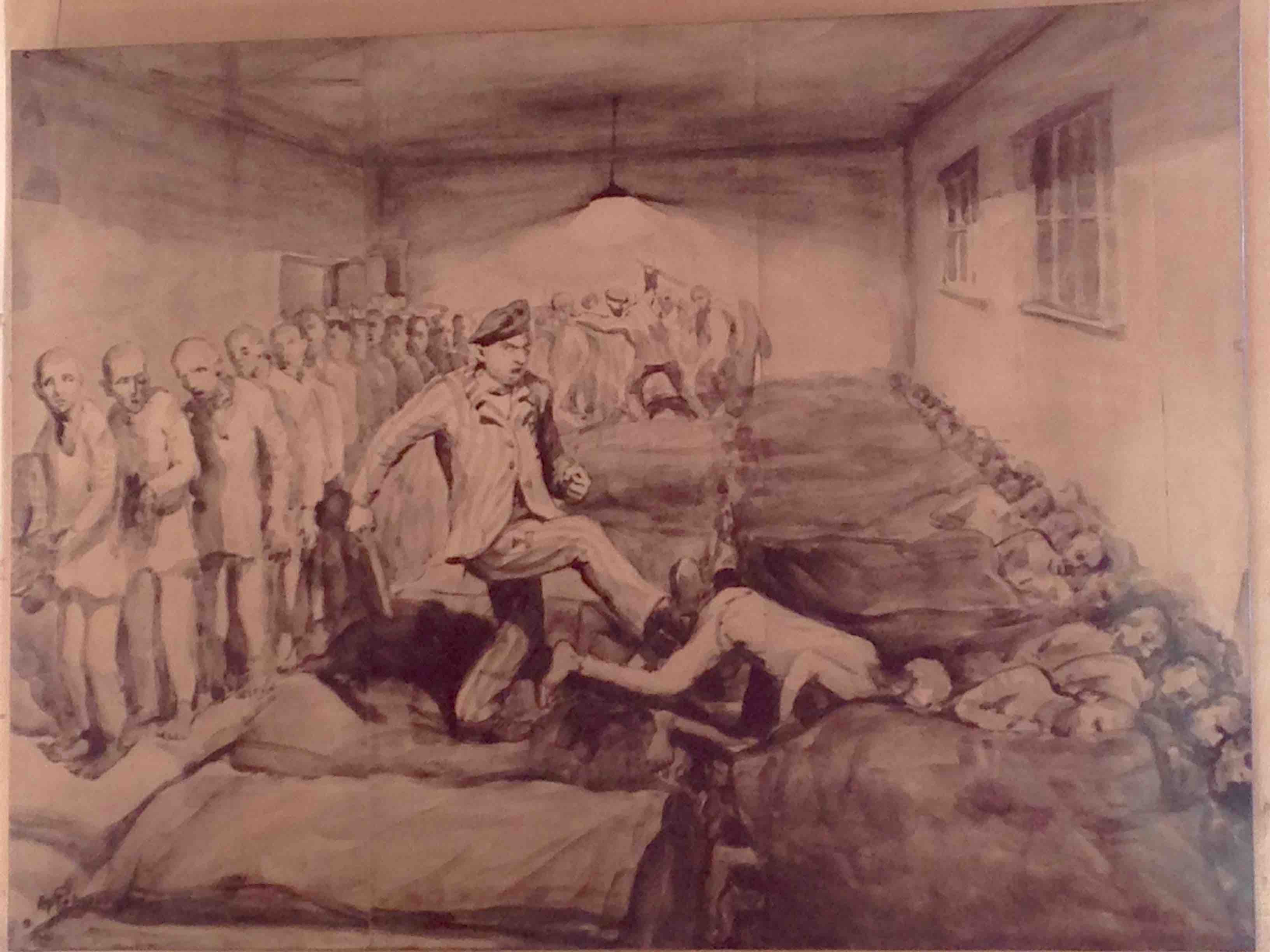
It has taken me all of my life to get up the courage to look the Holocaust in the face. My Buddhist chanting has strengthened me, and a few days ago, with my stomach in knots, I boarded a bus in Krakow for a guided English language tour of Auschwitz and Birkenau.
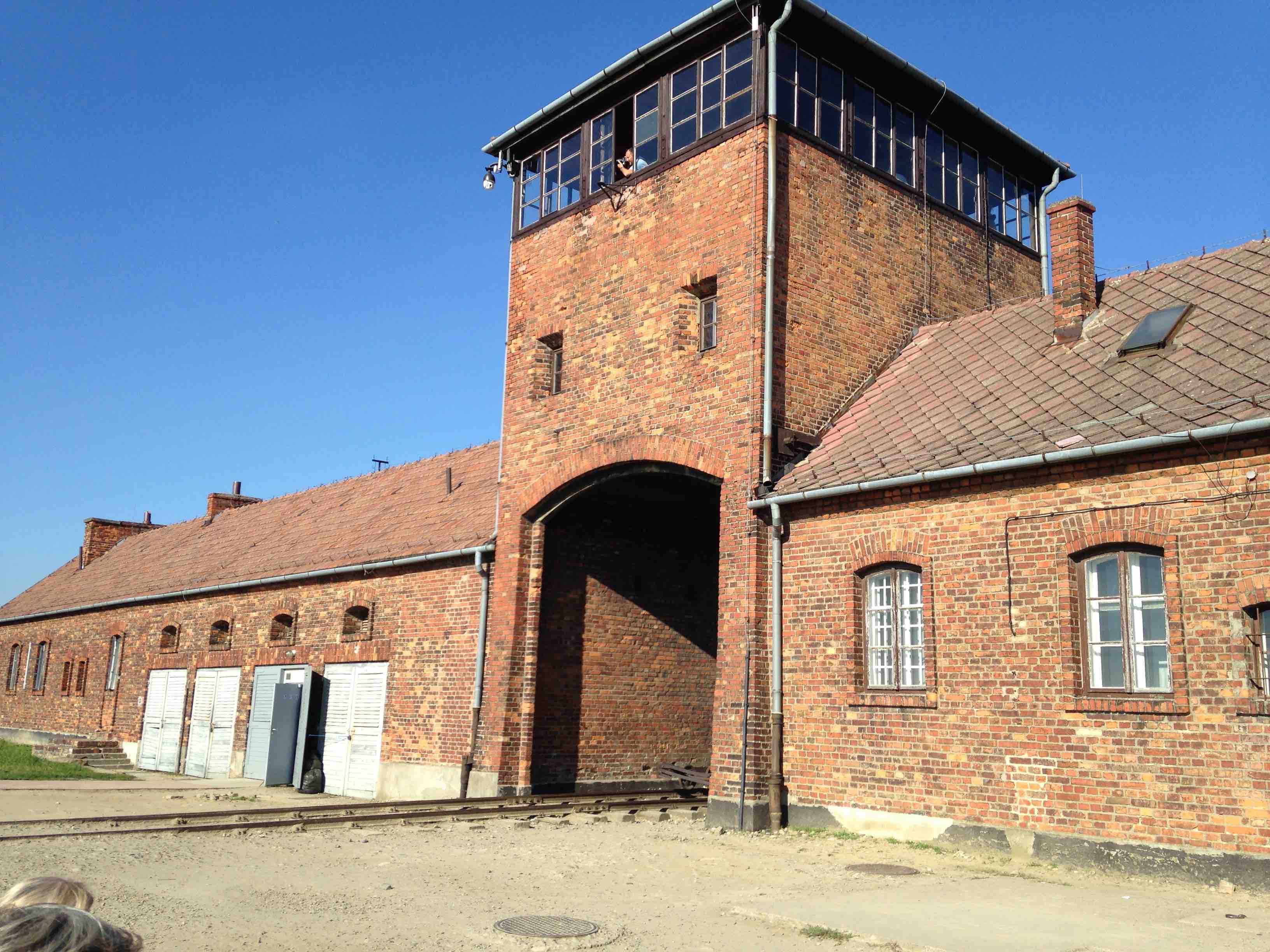
The trip there takes over an hour, and they showed a preparatory documentary en route, during which I cried. The driver was friendly, the coach was comfortable, and when we got to Auschwitz, the visitors of all nations were plentiful. Well organized, each group had it’s own channel on the audio system, with a local guide who spoke the language needed.
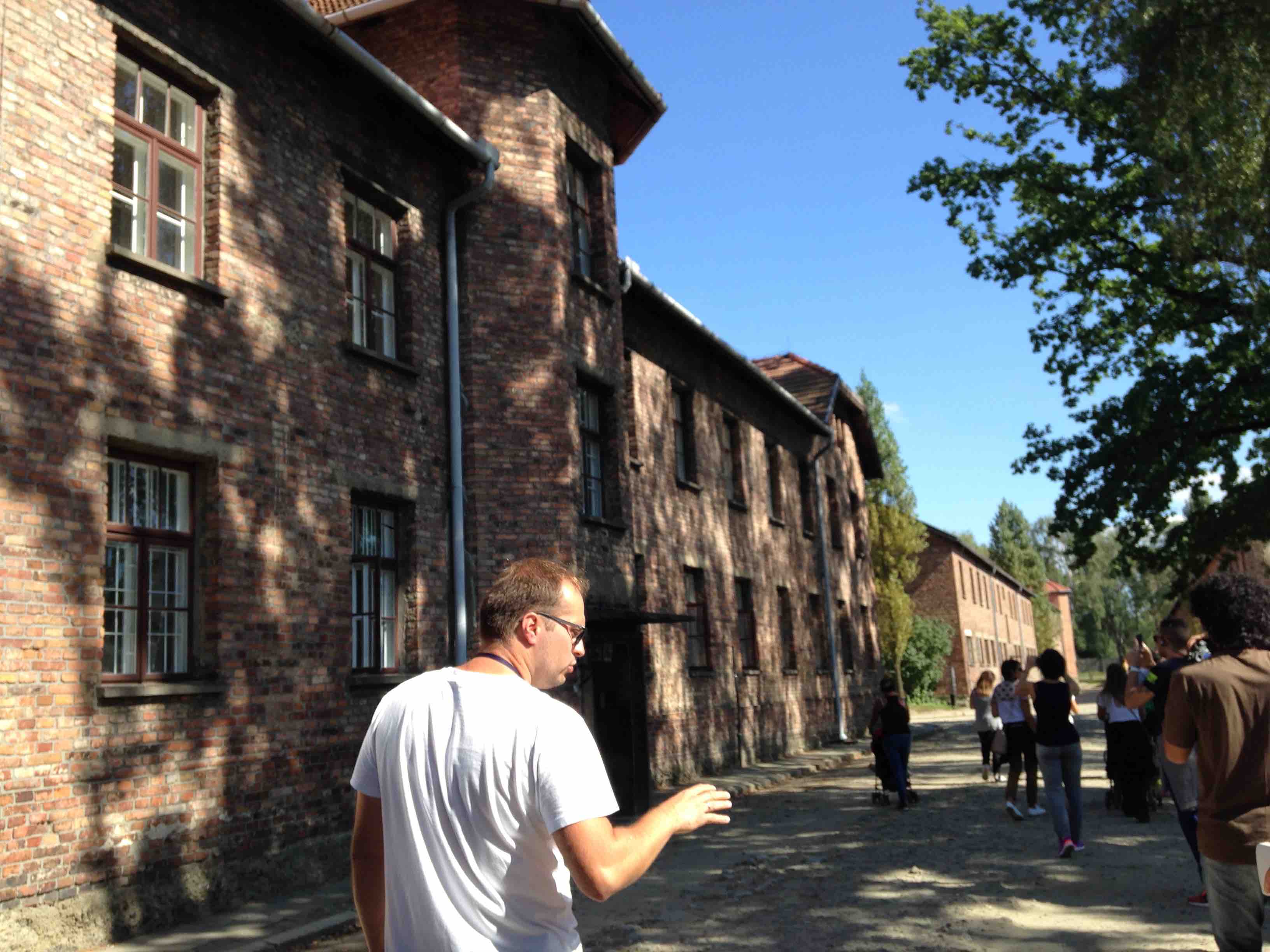 My guide was wonderful. He was not dispassionate. He clearly deplored the degradation, deceit, torture and death inflicted by the Nazis in the camps. He made it easier for me to bear.
My guide was wonderful. He was not dispassionate. He clearly deplored the degradation, deceit, torture and death inflicted by the Nazis in the camps. He made it easier for me to bear.
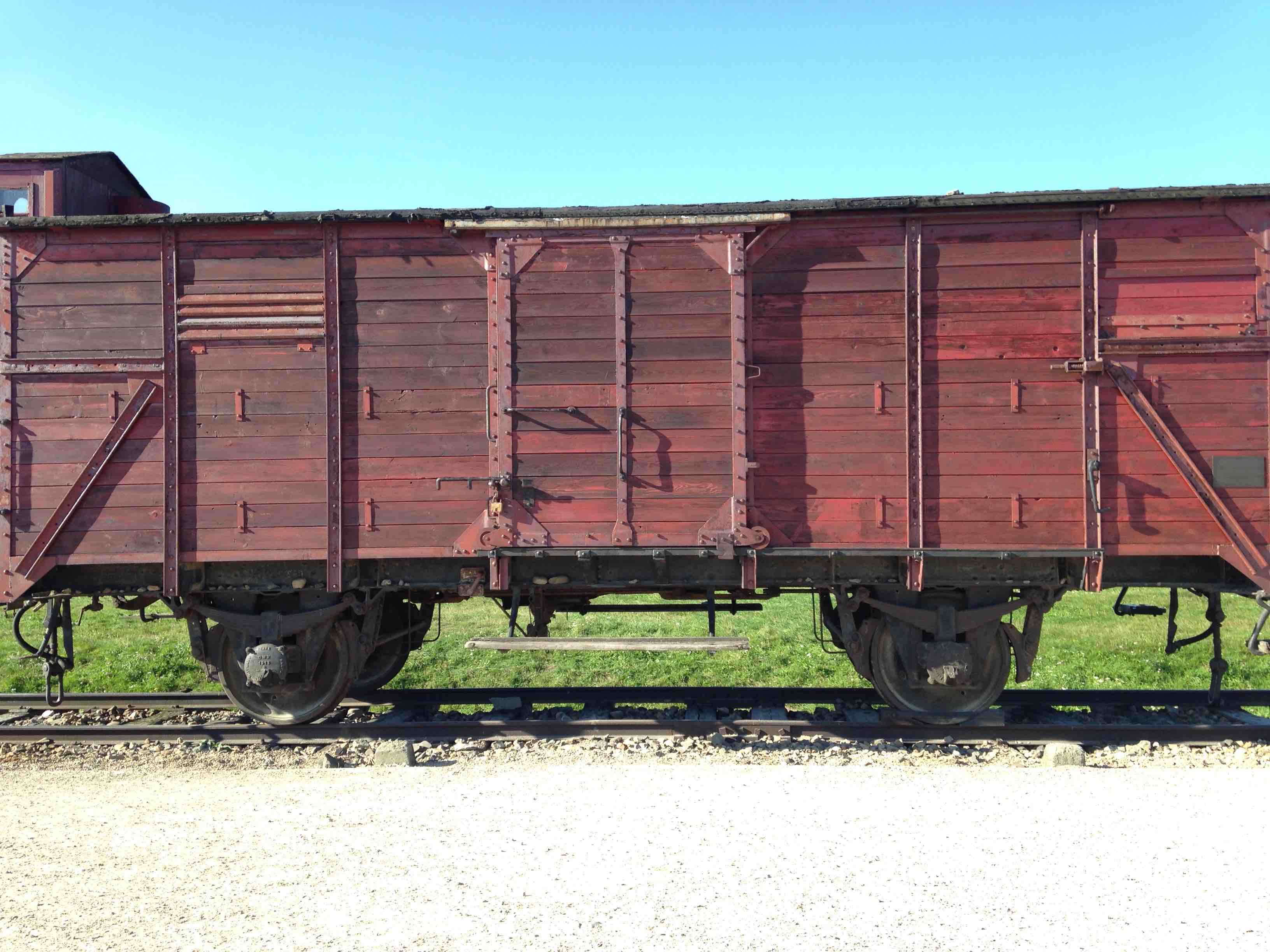 The camps are a UNESCO site, so preservation has been carefully seen to, with delicate artifacts such as human hair, shoes and personal belongings protected behind glass as you walk the camp and inside the buildings, with the guide pointing out both conditions of life and methods of death in the actual setting, telling stories that made it all too real.
The camps are a UNESCO site, so preservation has been carefully seen to, with delicate artifacts such as human hair, shoes and personal belongings protected behind glass as you walk the camp and inside the buildings, with the guide pointing out both conditions of life and methods of death in the actual setting, telling stories that made it all too real.
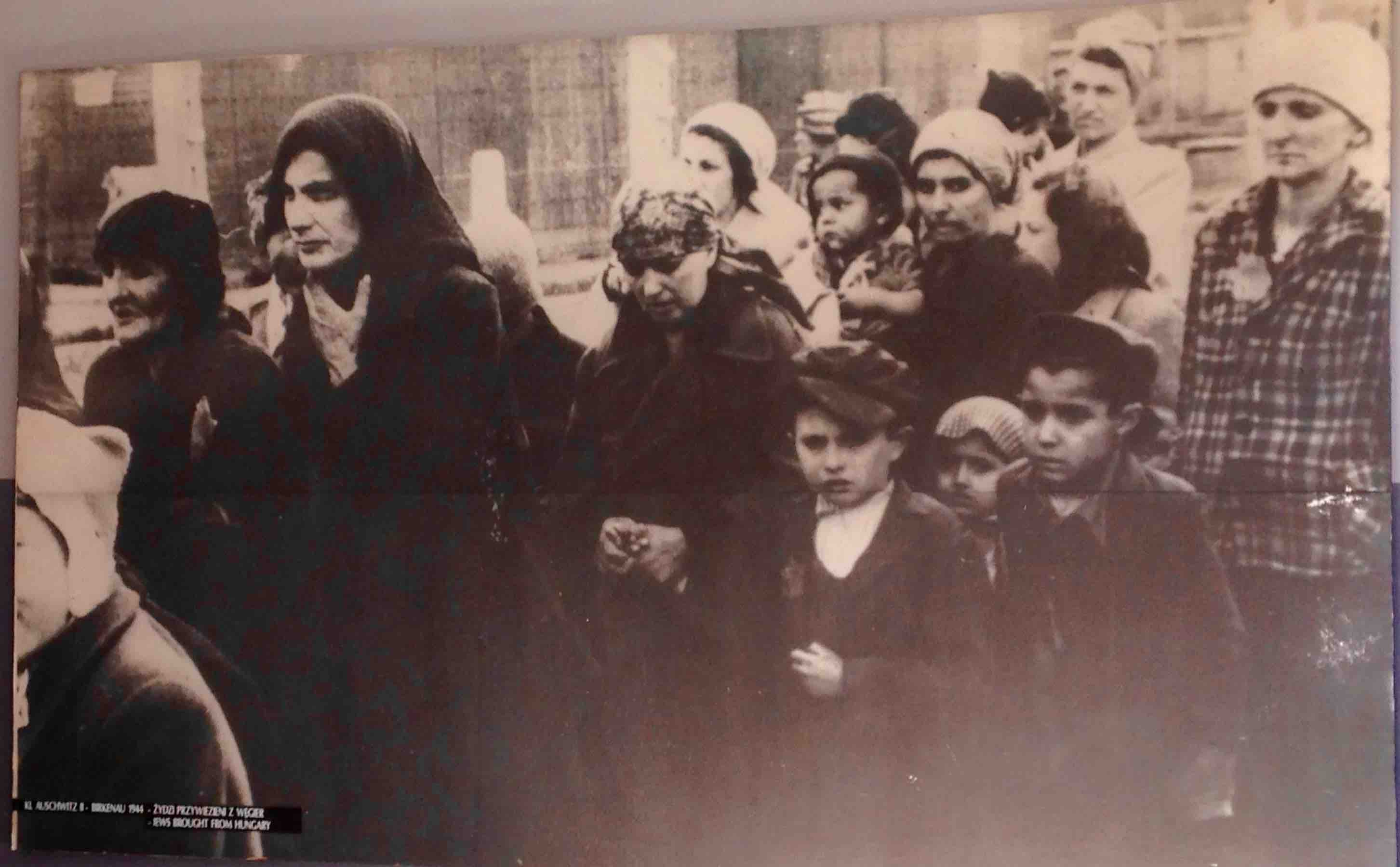 The railroad car in which they arrived packed like cattle, the train platform where 75% – the weakest ones who could not do hard labor – were immediately lead off to the gas chambers, the straw mats and bunks where people were jammed like sardines to sleep, the latrines where the guards timed each person 15 seconds, the crematorium.
The railroad car in which they arrived packed like cattle, the train platform where 75% – the weakest ones who could not do hard labor – were immediately lead off to the gas chambers, the straw mats and bunks where people were jammed like sardines to sleep, the latrines where the guards timed each person 15 seconds, the crematorium.
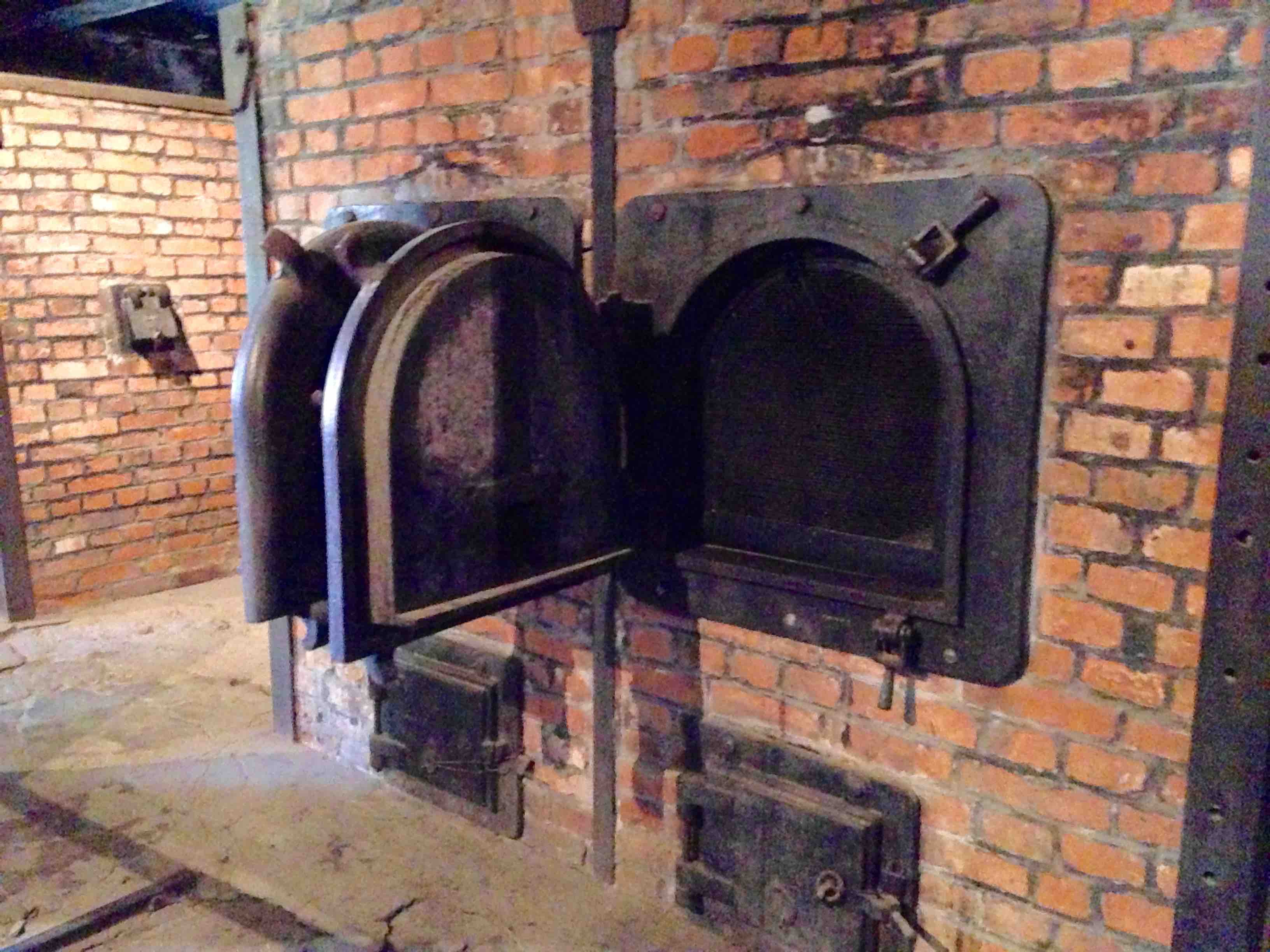 I mopped my eyes and took pictures and video. If they could bear to live it, I could bear to look at it. And I’m shaking with tears now, as I understand why it has been hard to sit down to write this.
I mopped my eyes and took pictures and video. If they could bear to live it, I could bear to look at it. And I’m shaking with tears now, as I understand why it has been hard to sit down to write this.
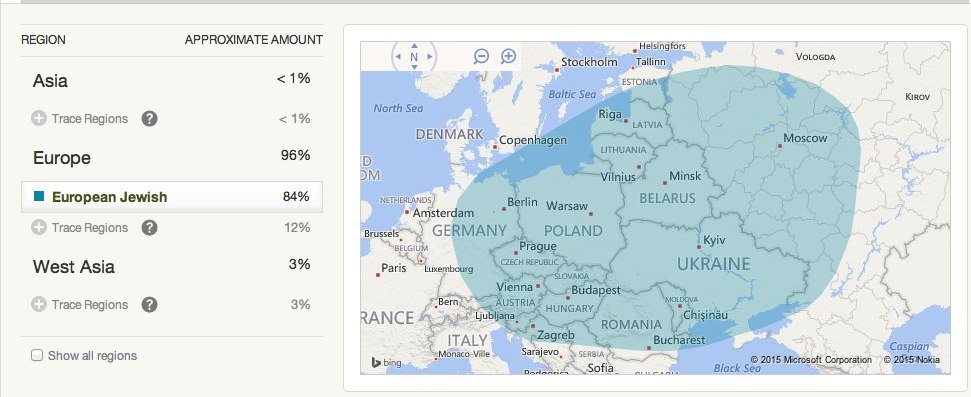 DNA analysis from two different sources (Ancestry.com and The Human Genographic Project) has told me that I am very Jewish. 84% Eastern European Jewish by Ancestry’s count, while results from the Genographic Project link my origins to the very first Ashkenazi Jews.
DNA analysis from two different sources (Ancestry.com and The Human Genographic Project) has told me that I am very Jewish. 84% Eastern European Jewish by Ancestry’s count, while results from the Genographic Project link my origins to the very first Ashkenazi Jews.
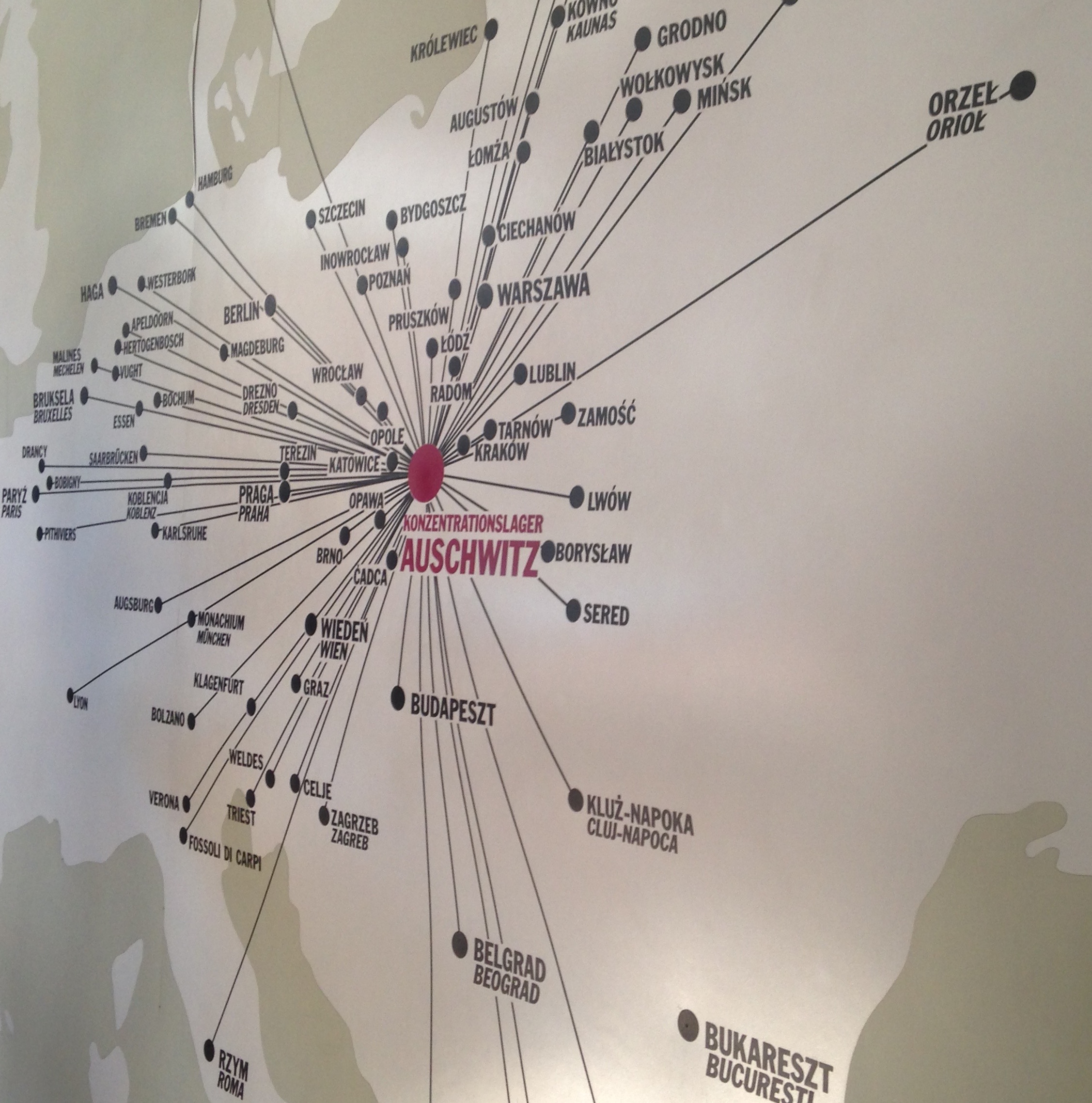
I’ve come to the conclusion that I can’t know my own people if I don’t look at this. I’ve understood that being Jewish includes having the Holocaust (and the cultural survival of historic persecution, even though as a New York Jew I haven’t felt it) be part of the definition of who you are. Looking it in the eyes is looking myself, and the story of my DNA, in the eyes.
After learning everyone else’s languages and singing everyone else’s songs, I’m hear to learn about my own, to accept my Jewishness into my heart with pride.
NOMAD NOTES – Chapter 3 – The Kindness of Strangers
NOMAD NOTES – Chapter 3 – The Kindness of Strangers – In the Air between Tel Aviv, Israel and Warsaw, Poland – August 23, 2016
I must write this NOW; I already feel my mind slipping into a new reality, as LOT Polish Air flight 152 carries me to what I presume to be the land of my mother’s ancestors, who all had names ending with –-sky. Nothing further is known about their birthplace. Those with the info left this life before I had the awareness to ask about it. So I go to stand where they stood. Tonight I will sleep in Krakow, Poland, in the Jewish quarter that still remains, even after the Holocaust, and I will visit Auchwitz, because now I am strong enough to bear it. I hope.
But first a tribute to the kindness of strangers in Israel.
Myth: Everything in Israel is in English.
Myth: Everyone in Israel speaks English.
Myth: Everyone in Israel is Jewish.
The wedding over, the relatives kissed, the presents given, the advice taken in, I took off in my red Kia for Akko, a Mediterranean port near Haifa, which was populated at least as far back as 500 B.C. (Hellenistic Greek ruins have been found; but it’s probably WAY WAY older) and which was the gateway for pilgrims traveling to the Holy Land during the Crusades in medieval times. I did not go straight there; to satisfy my curiosity I took a quick side trip to Tsfat (aka Zefat, aka Safed) high above the Sea of Galilee, a center for Klezmer music and extreme Jewish faith.
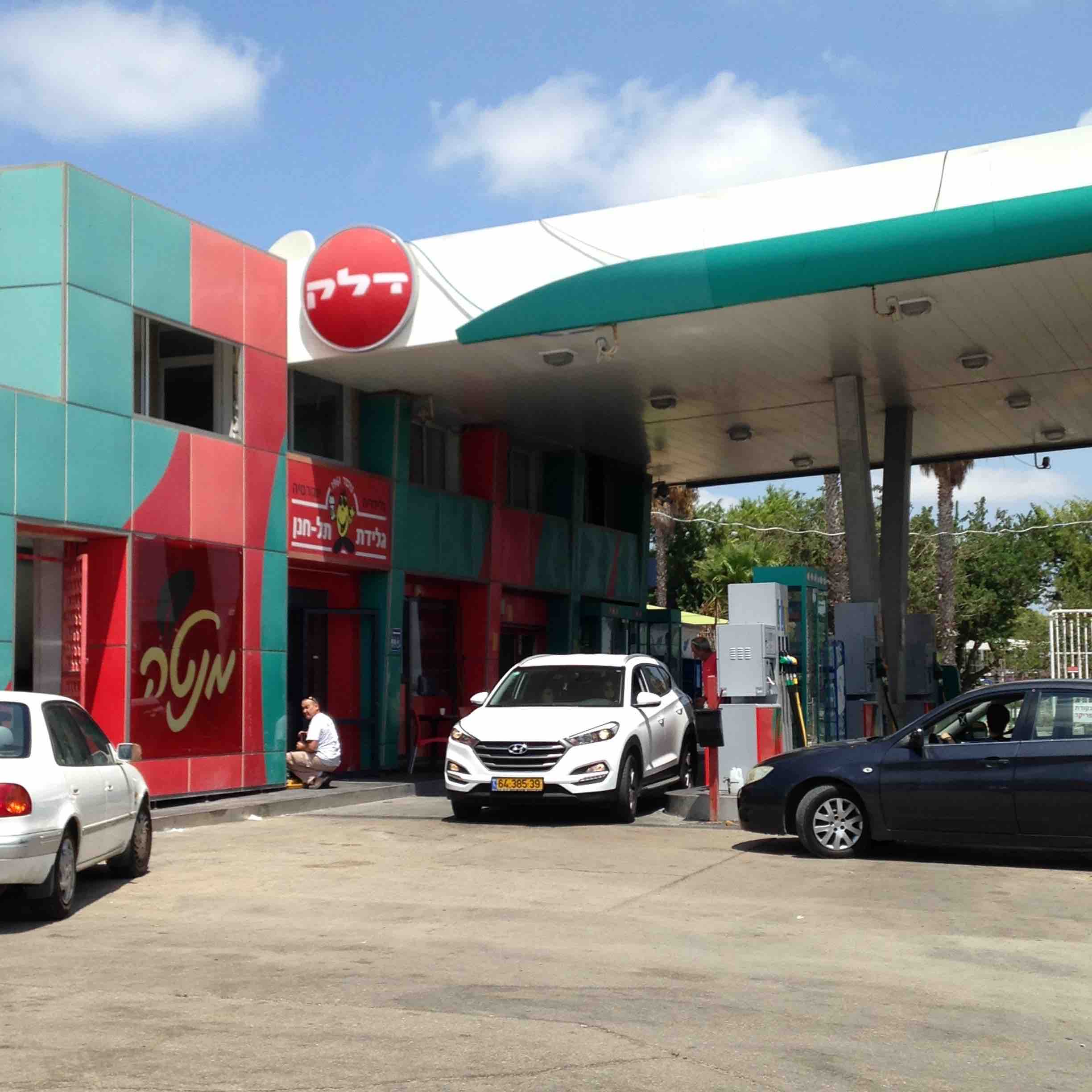 I stopped for gas. (Which by the way costs more than $50 a tank.) But how to fill it? No English option on the gas pump. If you need someone to speak English in Israel, ask young people. They learn it in school.
I stopped for gas. (Which by the way costs more than $50 a tank.) But how to fill it? No English option on the gas pump. If you need someone to speak English in Israel, ask young people. They learn it in school.
A lovely young woman taught me how: first you put the nozzle in the car. Then the credit card. Then you enter your license plate number, then your ID number, in my case my passport number. Then you can buy the gas. Note to USA Homeland Security.
The new navigation app WAZE was invented by an Israeli, and I’ve now downloaded it and made it speak to me in English. It’s great. Up the mountain to Tsfat.
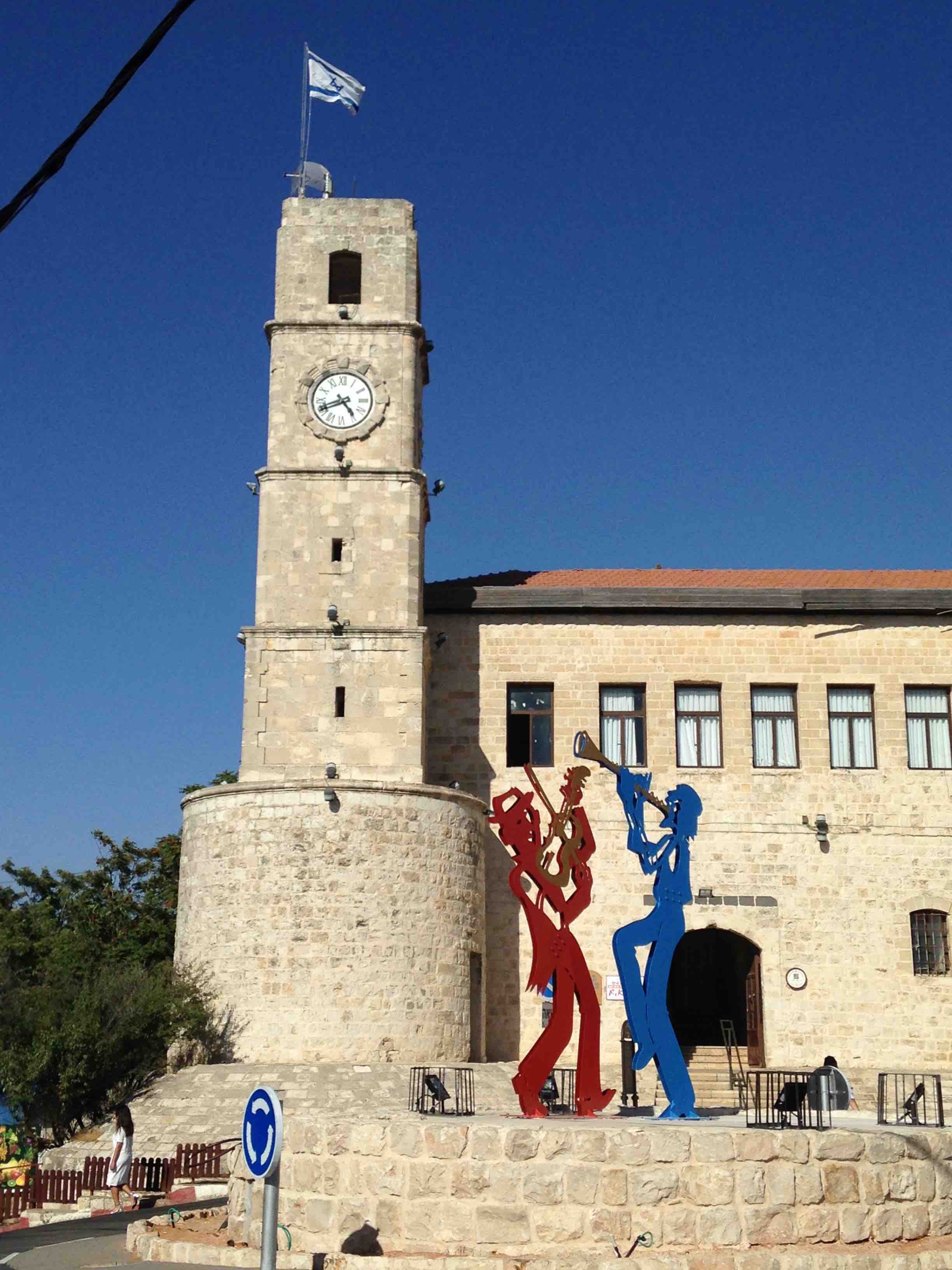 Since I arrived in Tsfat on the Sabbath, I was treated to a demonstration of that town’s extreme faith by the complete lack of activity in the town, which was to be expected. I headed down the mountain and west to the Mediterranean coast, to Akko (aka Acco, aka Acre, aka Akka), in search of my ancient past. It is blazing hot.
Since I arrived in Tsfat on the Sabbath, I was treated to a demonstration of that town’s extreme faith by the complete lack of activity in the town, which was to be expected. I headed down the mountain and west to the Mediterranean coast, to Akko (aka Acco, aka Acre, aka Akka), in search of my ancient past. It is blazing hot.
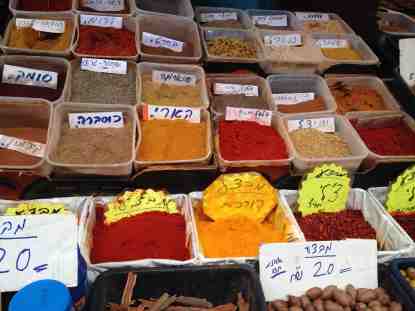 Israel is a narrow country and I arrive about 2 hours later at the ancient Mediterranean port of Akko. It is immediately apparent that I am in a different culture, while still within Israel. The roads are very narrow, the stores have signs in Arabic (an official language of Israel, along with Hebrew), the women are in head scarves and dressed very conservatively, the sounds of Arabic music waft through the air. And here’s me, brazenly coming into town in my red Kia.
Israel is a narrow country and I arrive about 2 hours later at the ancient Mediterranean port of Akko. It is immediately apparent that I am in a different culture, while still within Israel. The roads are very narrow, the stores have signs in Arabic (an official language of Israel, along with Hebrew), the women are in head scarves and dressed very conservatively, the sounds of Arabic music waft through the air. And here’s me, brazenly coming into town in my red Kia.
A man is headed directly at me on his bicycle. My danger “flares” go up. I consider myself open-minded and progressive, yet in an instant I have identified him as “Arab” and his action as a dare. As if daring me to stop, swerve, or hit him. Is this a power struggle? Is it because I am a Western woman driving a red car? Perhaps just because the streets are too narrow for modern day traffic? I brake and avoid him, of course. He does not slow down. I’m now on my guard. And I’m aware that I just had a demonstration of my own prejudice.
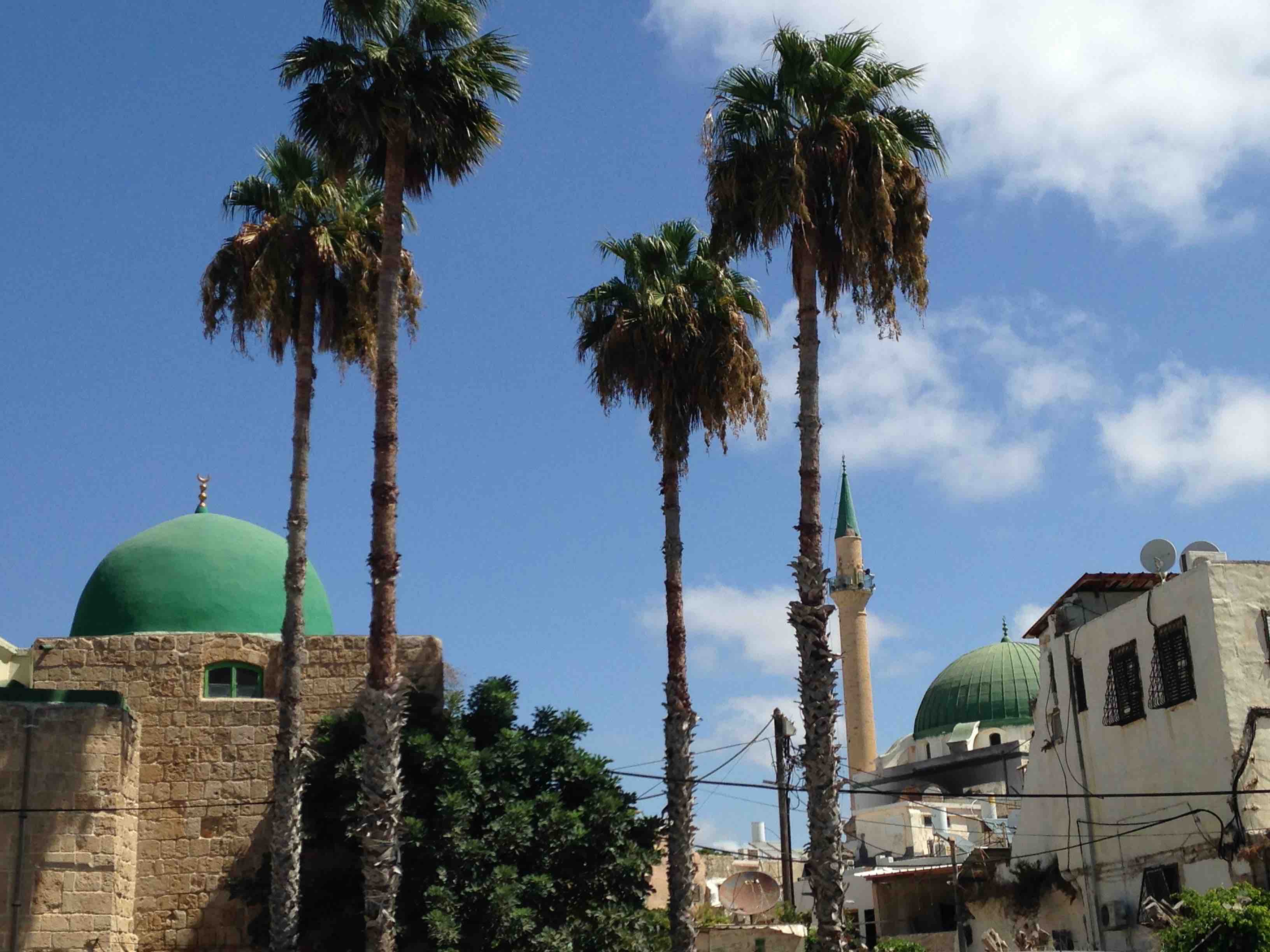 I make my way to my hotel, built into the medieval walls of the Crusades era. I park, check in, clean up, and head out at sunset to find a fresh fish for dinner. My short walk to the port confirms that I am in a different culture. Arabic music accompanies a horse-drawn carriage giving rides on the narrow cobbled streets, already crowded with impossible 2-way car traffic and pedestrians. Boats in the harbor also play music, wild and fast, families crowd the port, speaking in Arabic, a mosque in view.
I make my way to my hotel, built into the medieval walls of the Crusades era. I park, check in, clean up, and head out at sunset to find a fresh fish for dinner. My short walk to the port confirms that I am in a different culture. Arabic music accompanies a horse-drawn carriage giving rides on the narrow cobbled streets, already crowded with impossible 2-way car traffic and pedestrians. Boats in the harbor also play music, wild and fast, families crowd the port, speaking in Arabic, a mosque in view.
I feel conspicuous in my mini-skirt as I enter a restaurant and ask for a table for 1. Glad I have my long black cotton sweater on to cover my arms and legs, I sit and order. I’m ready for a vodka, but there is none, and I wouldn’t order it here anyway. The dinner is delicious and by the end I’m asked by the waiter where I come from. When I answer “San Francisco,” he nods knowingly. We smile. That explains it.
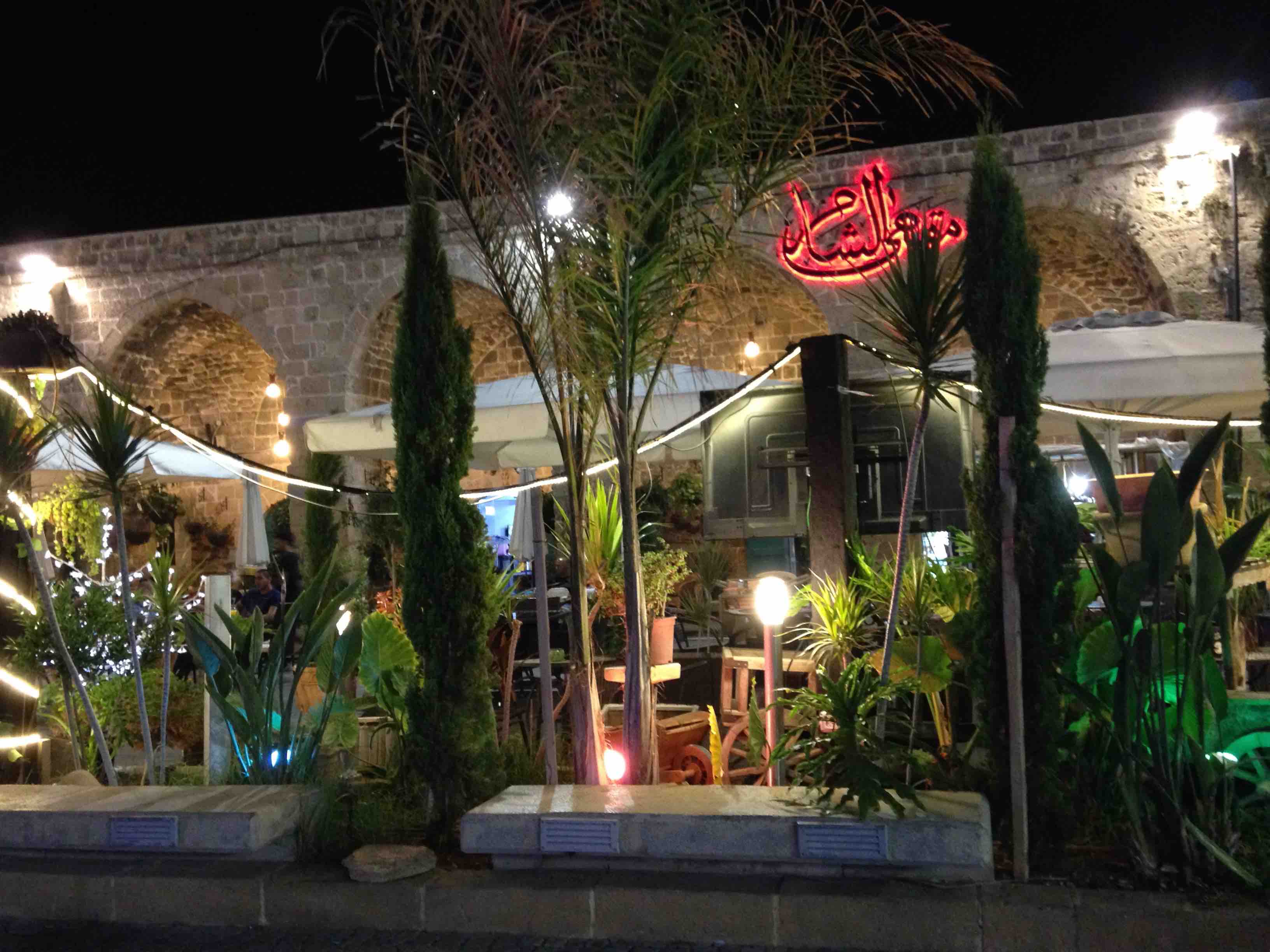 DAY TWO IN AKKO: I rise early to head out with my video camera, to capture the ancient streets in the morning light.
DAY TWO IN AKKO: I rise early to head out with my video camera, to capture the ancient streets in the morning light.
At the port, different in the daylight, I come upon a huge dead rat in the street, already being fed upon by insects. I’m revolted, and must remind myself that my dearest Venice, another port city, has its share of these tenaciously disgusting creatures. Both cities have a population of stray cats, which hopefully helps to keep things in check.
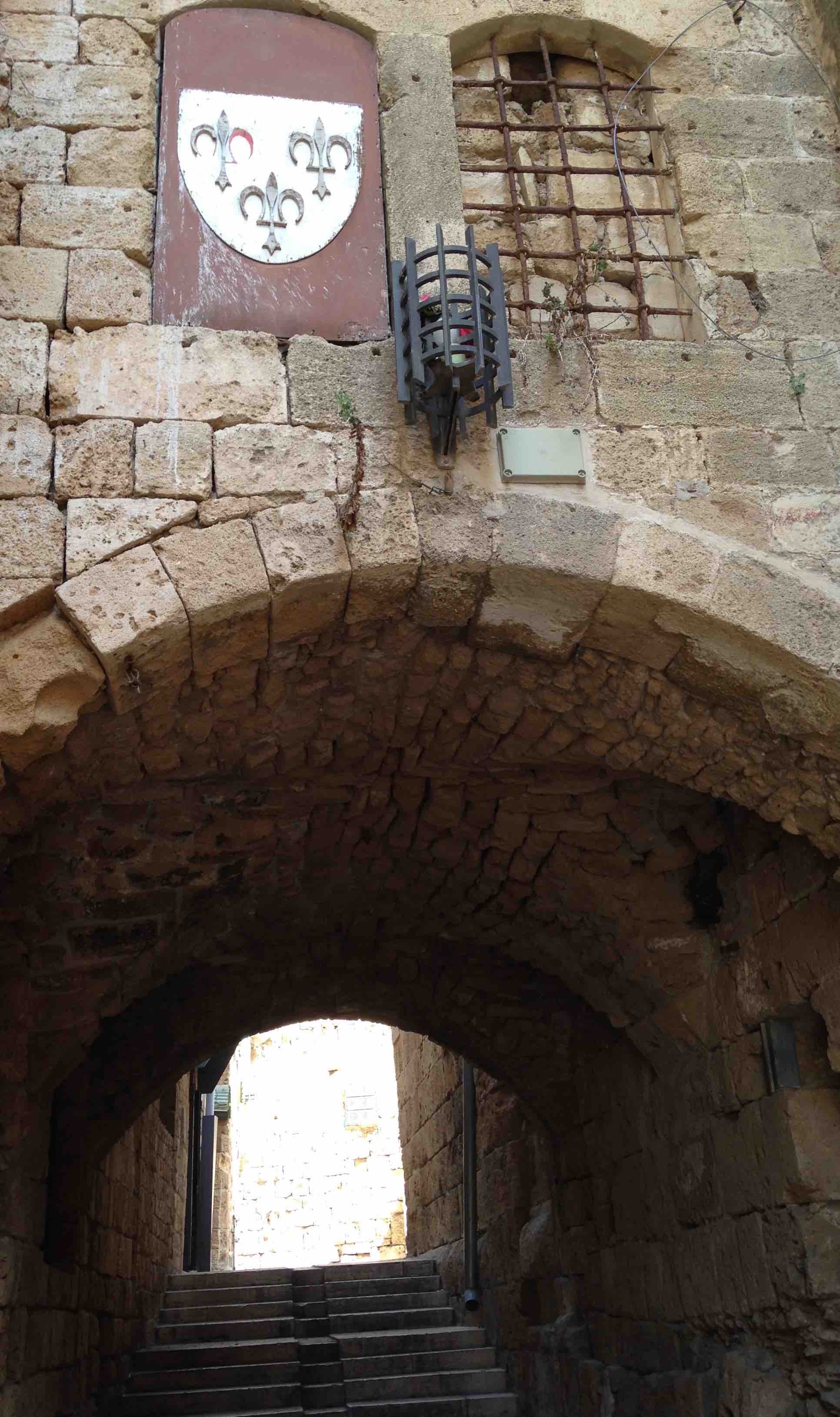 After breakfast, I purchase some items in the open air market on my way to the tourist info center. I walk where the Knights Templar have ridden, where pilgrims were cared for on their way to Jerusalem, traversing underground tunnels constructed 1000 years ago.
After breakfast, I purchase some items in the open air market on my way to the tourist info center. I walk where the Knights Templar have ridden, where pilgrims were cared for on their way to Jerusalem, traversing underground tunnels constructed 1000 years ago.
In the afternoon, I head off in the car, thinking I’m making a short trip to the Baha’i Gardens, but I miss the turn and so decide to go to Haifa instead, 25 minutes south. Not having researched (word to the wise: if you don’t know the language, do the research first)
I log into WAZE and simply put in Haifa Port.
I end up behind a slow moving line of huge trucks, bound for the port. I’m locked in, there are no turnoffs, my phone is dying, I don’t have my backup charger and I have very few Israel shekels with me. And I don’t actually know where I am going. I want to find a nice café, then a nice place to have dinner after I tour the town.
HA-HA. I finally get out of the truck line and bail to a working class neighborhood, which might have been called HADAR, near Haifa’s City Hall. Triumphantly I find a parking lot that has a system like the Sutter-Stockton Garage in San Francisco; you get a ticket upon entering and pay at a machine before you leave.
Another fabulous young Israeli woman answers my questions about the parking lot, I go check out the machine where I’ll pay in the end, and I’m off on foot, phone dead, making little drawings and notes with a pen in my diary so I can find my way back. Like breadcrumbs.
Gone my thoughts of dinner in Haifa, over a double espresso I decide I’d better head back to Akko. I pass a cellphone store. A Russian man sells me a car charger for my last 25 shekels. The box is so old he throws it away; the receipt is so faint as to be barely readable. He says I can return it if it doesn’t work. Fat chance.
I put my Wells Fargo bank card in at Bank Hapolim, expecting to get shekels. They don’t accept it.
I re-trace my steps to the parking lot, sure I can pay with my credit card for my parking. Again, no English in the machine. I buzz and ask for help in English. A male voice yells at me in Hebrew, obviously saying “I don’t speak English; don’t you understand?”
Yet another lovely young woman passes and understands my plight. She escorts me up one floor in the elevator, using gestures to communicate. Calls the supervisor to help. Puts my card in for me, helps me pay. I’m good to go. Blessings on you, thank you.
Now, just to get back to Akko with no cell phone, and not even a paper map. As you may expect, the car charger sold me by the Russian guy is a dud.
It’s time to roll down the car window and do it like the old days. Gestures and the name of the destination. At a traffic light, I ask a guy on the curb, “Which way, Akko?” He understands the question but has trouble explaining. I say, with hand gestures, “22, Blue?” (Route 22, designated by blue signs). A triumphant Yes! We have communicated. I’m off to Akko, which I reach fairly quickly with a sigh of relief.
But it’s not over yet.
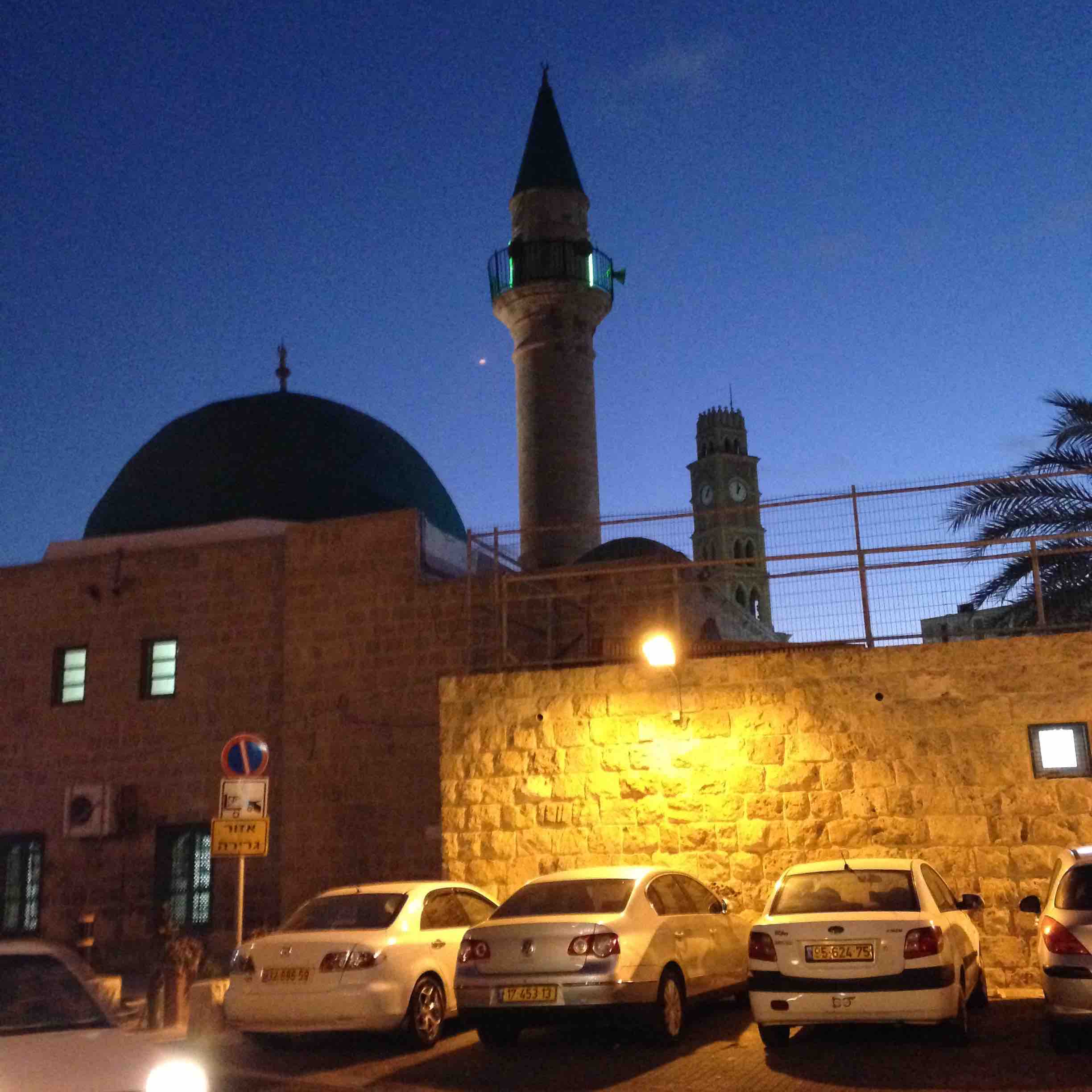 In the maze of narrow streets and roundabouts, I make a wrong turn. I need to retrace my route in the town. The nightmare of the narrow streets is now mine. Scared I’m going to scratch my rented car, lost, making my second K-turn with no space, it is 7:25pm, the skies are darkening and the Moslem call to prayer sounds from a mosque right near me. But I have no cellphone to record it.
In the maze of narrow streets and roundabouts, I make a wrong turn. I need to retrace my route in the town. The nightmare of the narrow streets is now mine. Scared I’m going to scratch my rented car, lost, making my second K-turn with no space, it is 7:25pm, the skies are darkening and the Moslem call to prayer sounds from a mosque right near me. But I have no cellphone to record it.
A lovely Arabic man rescues me, guides me through a narrow passage and instructs me how to get back to my hotel. In English. I’m SO grateful, and silently vow to toast him with a vodka in my hotel bar immediately upon my return.
Which I do. I’ve learned a lot in Akko.
NOMAD NOTES – Chapter 2 – The Rewards of Courage
NOMAD NOTES – a series of blogs about and inspired by my meanderings into the places of my ancient past
Chapter 2 – The Rewards of Courage – Golan Heights, Israel – August 18, 2016
In Nichiren Buddhist practice they talk about “making a cause;” in other words, taking action to achieve a desired result, like cause and effect. Today I cried tears of gratitude that I plucked up my courage to come to the Golan Heights to my cousin’s wedding. For more reasons than one.
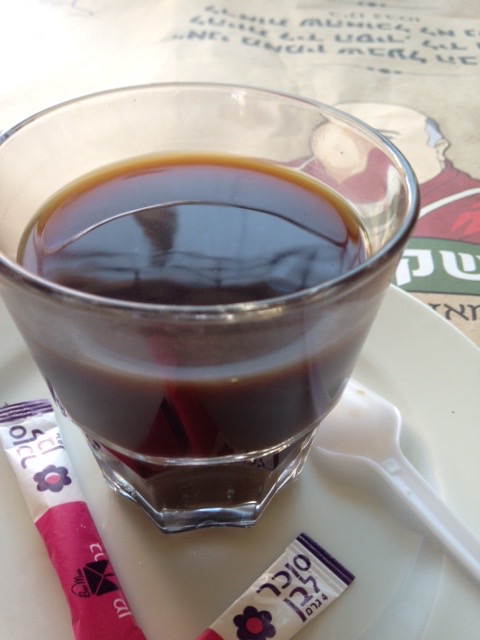 Yesterday, fueled by Turkish coffee, I went through with my car rental, and having not yet discovered that I could make my GPS talk to me (I later did, thank God) I navigated back to my Tel Aviv hotel using a paper map. Yes. After about an hour of wrong turns and one-way streets, driving a new car and with little knowledge of Israeli traffic laws, by the miracle of persistence I arrived to pick up my luggage. The supportive desk clerk gave me a big bottle of water (it was blazing hot out), I loaded the car, and managed to start it again. Note to USA Homeland Security: Israeli rental cars require a secret code to be punched in on a dashboard keypad, or the engine will not start with the key.
Yesterday, fueled by Turkish coffee, I went through with my car rental, and having not yet discovered that I could make my GPS talk to me (I later did, thank God) I navigated back to my Tel Aviv hotel using a paper map. Yes. After about an hour of wrong turns and one-way streets, driving a new car and with little knowledge of Israeli traffic laws, by the miracle of persistence I arrived to pick up my luggage. The supportive desk clerk gave me a big bottle of water (it was blazing hot out), I loaded the car, and managed to start it again. Note to USA Homeland Security: Israeli rental cars require a secret code to be punched in on a dashboard keypad, or the engine will not start with the key.
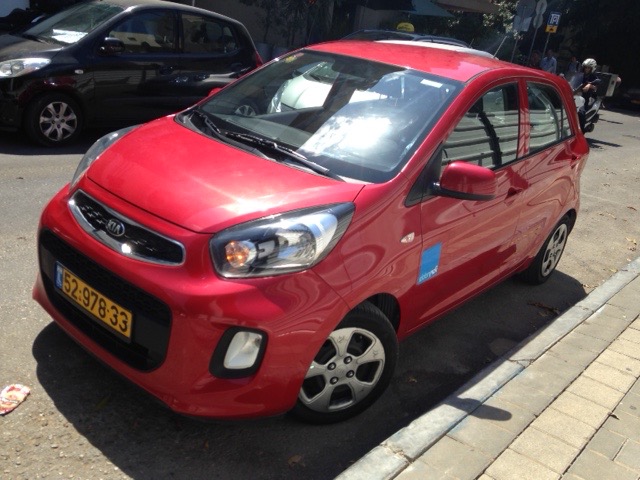 I’ve now learned that there are about four names for everything in Israel. Both Hebrew and Arabic are official languages and much of the signage is also in English, which is taught beginning in elementary school. There are ancient names and more modern names, there are colloquial names and official names, and there are different ways of transliterating the Hebrew and Arabic alphabet into our Roman alphabet spelling. So I’ve got 3 sets of directions. One in colloquial English from my cousin (with options), I’ve got yet another paper map from the car rental place, and I’ve got my GPS, which by now is talking. The directions themselves blow my mind: turn left at the Sea of Galilee, take the road to Nazareth; I feel like I’m in the Bible driving a red Kia.
I’ve now learned that there are about four names for everything in Israel. Both Hebrew and Arabic are official languages and much of the signage is also in English, which is taught beginning in elementary school. There are ancient names and more modern names, there are colloquial names and official names, and there are different ways of transliterating the Hebrew and Arabic alphabet into our Roman alphabet spelling. So I’ve got 3 sets of directions. One in colloquial English from my cousin (with options), I’ve got yet another paper map from the car rental place, and I’ve got my GPS, which by now is talking. The directions themselves blow my mind: turn left at the Sea of Galilee, take the road to Nazareth; I feel like I’m in the Bible driving a red Kia.
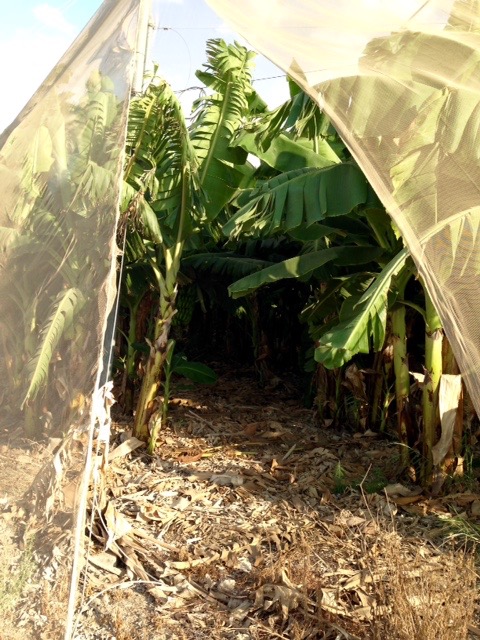 Americans are used to navigating long distances with freeway NUMBERS. Take 101 north, take 280 south. I’m triaging the directions as I go, making sure I don’t go by way of Tiberias, even though the GPS wants me to; my cousin has advised against it. (why?) Finally, I begin to get closer, passing banana and coconut plantations. This is getting very exotic.
Americans are used to navigating long distances with freeway NUMBERS. Take 101 north, take 280 south. I’m triaging the directions as I go, making sure I don’t go by way of Tiberias, even though the GPS wants me to; my cousin has advised against it. (why?) Finally, I begin to get closer, passing banana and coconut plantations. This is getting very exotic.
I’ve been told by the car rental company not to leave the country with the car, which I have no intention of doing, yet in my final ascent to the Golan Heights, at a certain point I get a text message: “Welcome to Jordan.” I’m momentarily terrified but I keep going up the winding road, chanting my Buddhist mantra as I go, telling myself it was just momentary airspace in the hairpin turn. Glorying in the fact that I am DOING this, determined to get there, because there is no other way!!
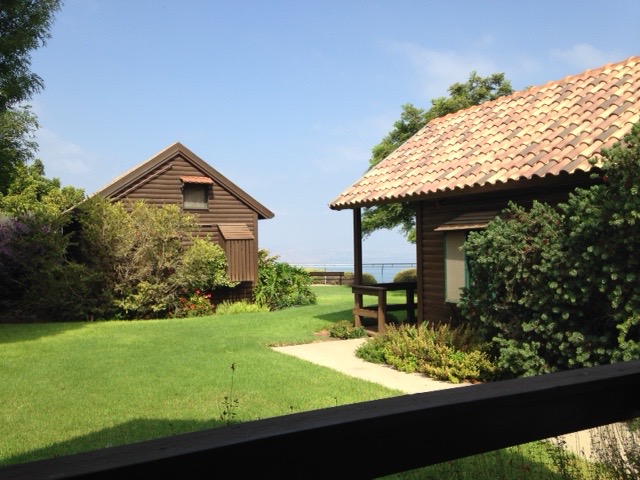 I finally reach the Kibbutz and manage to find my cousins, whom I embrace in victorious celebration. All the out of town family members are staying in a country lodge – “Peace Vista” – beautiful rustic-style cabins run by the Kibbutz as a commercial venture. There is a breathtaking view of the Sea of Galilee below. Biblical.
I finally reach the Kibbutz and manage to find my cousins, whom I embrace in victorious celebration. All the out of town family members are staying in a country lodge – “Peace Vista” – beautiful rustic-style cabins run by the Kibbutz as a commercial venture. There is a breathtaking view of the Sea of Galilee below. Biblical.
And now, the other reason for coming: my cousin’s American mother, now 80 years old, to whom I spoke sharply, out of grief, the last time we saw each other, when my own mother was dying in 2004 and she came to say goodbye to her beloved aunt. For 12 years I have sought a way to make peace but I knew that coming to her daughter’s wedding would be the only sure way. I embrace her and she hugs me back after a moment’s awkwardness. Over dinner in the rustic (Kosher) restaurant, I reach across the table and ask her forgiveness, which she gives to me.
The evening brings me together with the Israeli side of the family that my American cousin married into more than 40 years ago; relatives I have not seen since 1999.
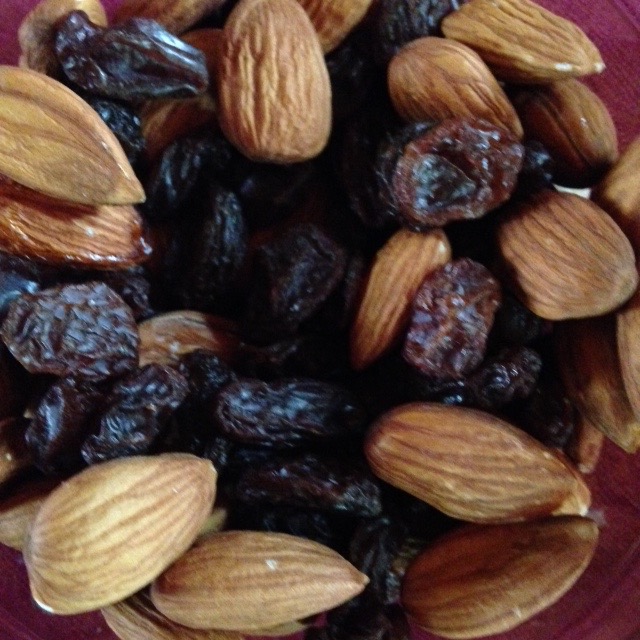 This morning at 9 a.m. a beautiful breakfast is delivered to the door of my cabin, featuring products that are made on the Kibbutz, including the traditional Raisins & Almonds, like the Jewish lullaby.
This morning at 9 a.m. a beautiful breakfast is delivered to the door of my cabin, featuring products that are made on the Kibbutz, including the traditional Raisins & Almonds, like the Jewish lullaby.
And tonight 350 people will dance at my Israeli cousin’s wedding. So today I cry copious tears of gratitude. Even now as I write. Because I have been courageous to have “made a cause” by deciding to come, and have already been rewarded for my courage.
Nomad Notes – Chapter 1
Nomad Notes will be a series of blogs about and inspired by my meanderings into the places of my ancient past.
Chapter 1 Tel Aviv, Israel August 16, 2016
It’s 10pm and I’ve just completed my first full day in Tel Aviv, a city I did not visit on my one and only other time in Israel, more than 15 years ago. Then, as now, I came for a cousin’s wedding, and this year that was the only thing that would get me on a plane. I have always reveled in travel, but the terrorist events of the past months have shaken my characteristic bravado.
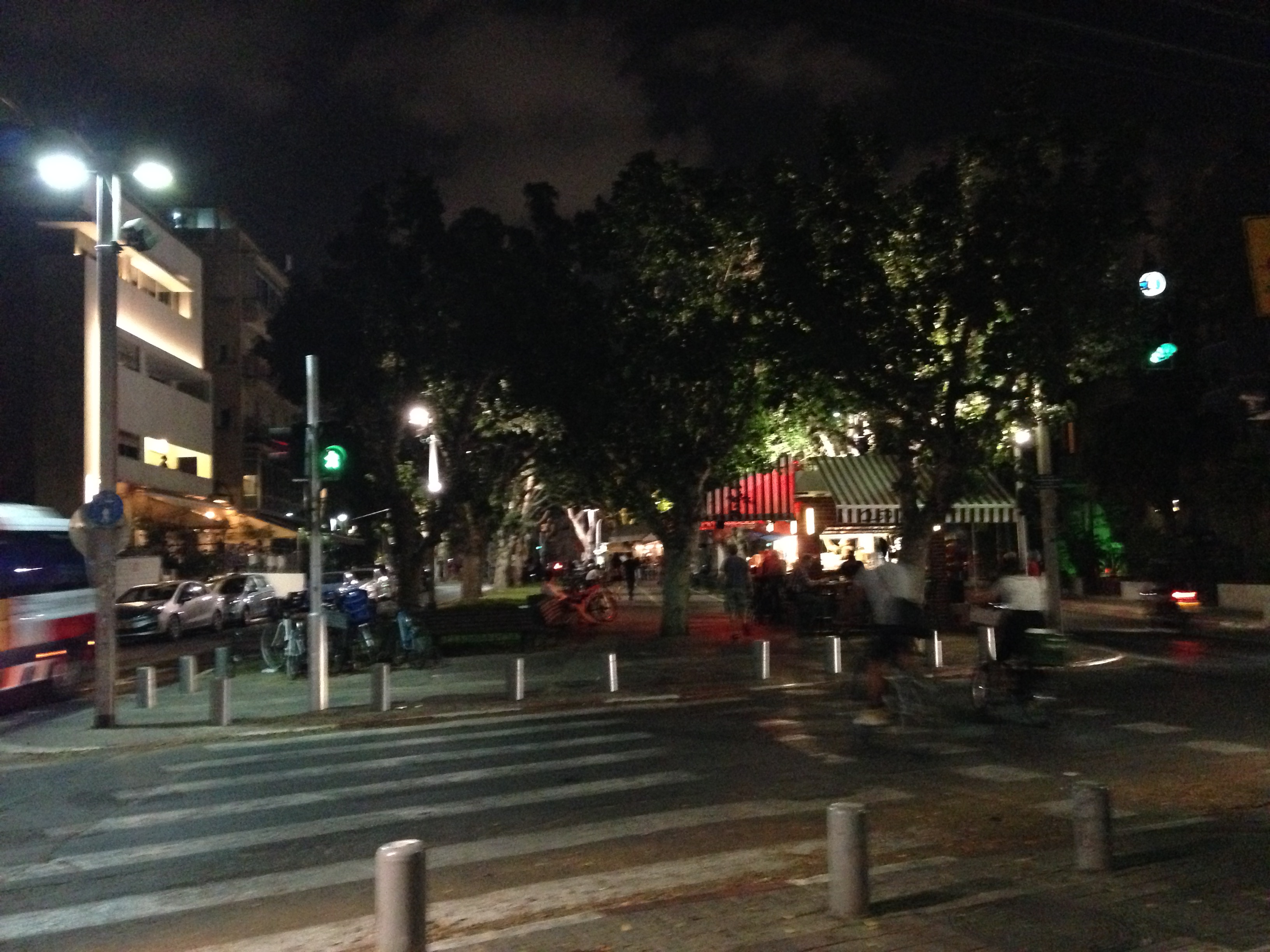 The Boulevard de Rothschild reminded me of the Ramblas in Barcelona; a warm night, a European vibe, even on a Tuesday populated with cyclists, walkers, eateries and music, the wide center promenade flanked by passing cars. Not all that easy, however, to find a full bar with food, but I settled into a bar seat at a Georgian restaurant and drank Russian vodka with my chicken dish, lucky that the young bartender spoke enough English for me to quiz her about my food intolerances.
The Boulevard de Rothschild reminded me of the Ramblas in Barcelona; a warm night, a European vibe, even on a Tuesday populated with cyclists, walkers, eateries and music, the wide center promenade flanked by passing cars. Not all that easy, however, to find a full bar with food, but I settled into a bar seat at a Georgian restaurant and drank Russian vodka with my chicken dish, lucky that the young bartender spoke enough English for me to quiz her about my food intolerances.
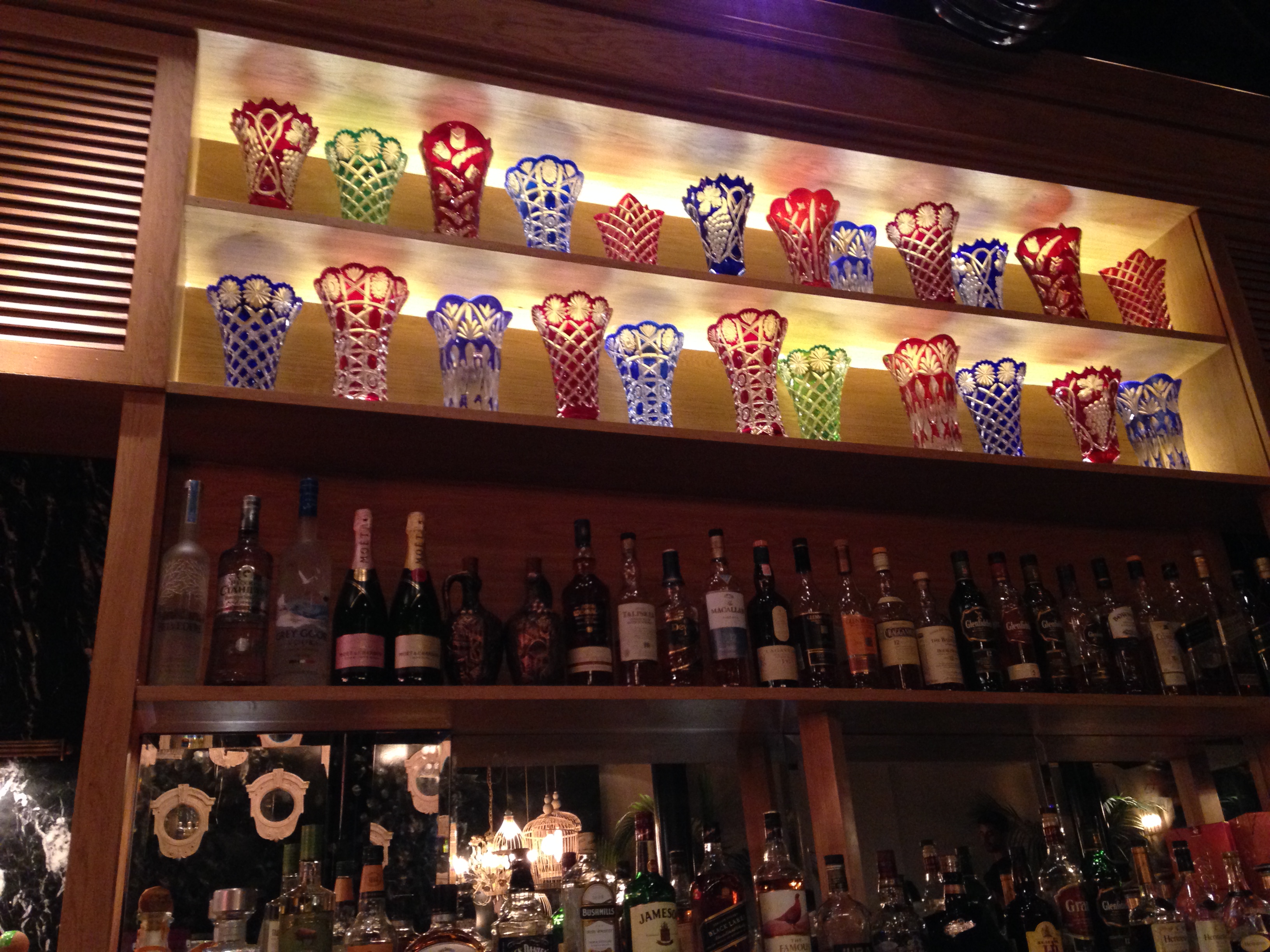 I thought about my reason for being here as I ate the peppery chicken and vegetables. Yes, the wedding got me on the plane, but there is so much more. And as I write it now, I begin to tear up. I am finally strong enough, thanks to my Buddhist practice, to look the Holocaust in the eyes, to embrace my Jewishness, to seek out my roots in Eastern Europe, my destination after Israel. San Francisco is a wonderful place, and it’s so near California! I can’t bear to get on a plane, spend a bunch of money, and come right home. So my plans will finally take me, for the first time in my life, to the lands where generations of my ancestors struggled, survived, laughed, cried and died. After singing everyone else’s songs and learning everyone else’s languages, finally now I am ready to embrace my own culture and my family’s past. I want to stand where they stood.
I thought about my reason for being here as I ate the peppery chicken and vegetables. Yes, the wedding got me on the plane, but there is so much more. And as I write it now, I begin to tear up. I am finally strong enough, thanks to my Buddhist practice, to look the Holocaust in the eyes, to embrace my Jewishness, to seek out my roots in Eastern Europe, my destination after Israel. San Francisco is a wonderful place, and it’s so near California! I can’t bear to get on a plane, spend a bunch of money, and come right home. So my plans will finally take me, for the first time in my life, to the lands where generations of my ancestors struggled, survived, laughed, cried and died. After singing everyone else’s songs and learning everyone else’s languages, finally now I am ready to embrace my own culture and my family’s past. I want to stand where they stood.
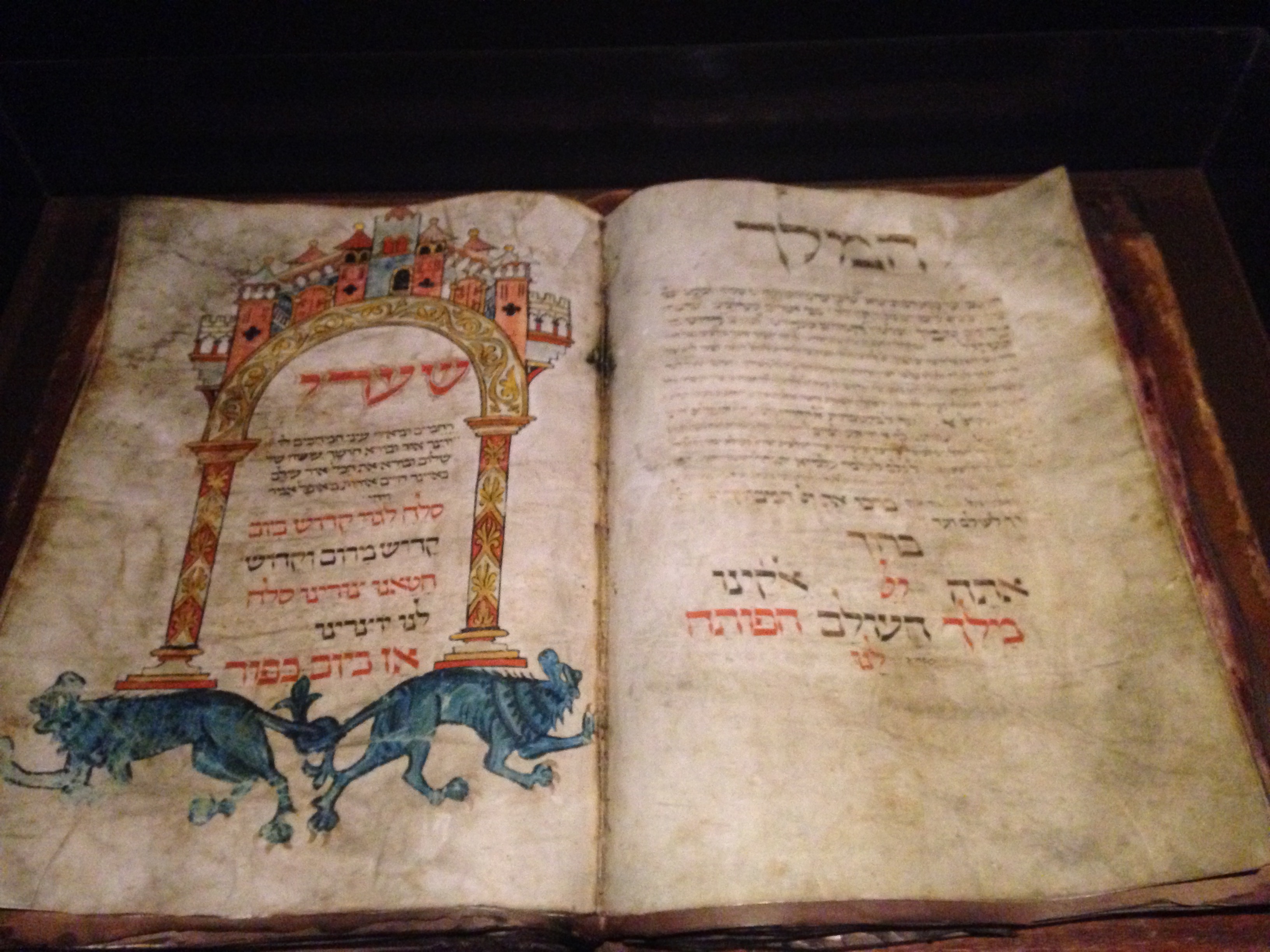 Today I went to the Museum of the Jewish Diaspora (Beit Hatfutstot) at Tel Aviv University. I saw many images that touched me; brought me to tears like this holy book did, and also at the resemblance of myself and my family to some of the people in the photos, paintings and videos. I am lucky that my branch of the family emigrated to the USA in the early 1900’s. That’s how I am alive today. I saw my DNA in those photos.
Today I went to the Museum of the Jewish Diaspora (Beit Hatfutstot) at Tel Aviv University. I saw many images that touched me; brought me to tears like this holy book did, and also at the resemblance of myself and my family to some of the people in the photos, paintings and videos. I am lucky that my branch of the family emigrated to the USA in the early 1900’s. That’s how I am alive today. I saw my DNA in those photos.
Did those boys with the stars on their shirts survive? Was the man on the left a relative of mine? He looks like my father did as a youth. The Italian bride and the Polish Jewess both remind me of me and my mother.
“This is the story of a people which was scattered over all the world and yet remained a single family, a nation which time and again was doomed to destruction and yet out of ruins rose to new life.” – Abba Kovner
Abba Kovner was a Jewish Hebrew poet, writer and partisan leader. He became one of the great poets of modern Israel, but I just learned about him today. Pretty much a contemporary of my father, he was educated at Vilna University. My father’s family came from Vilna. His face has the same shape as my father’s did as a youth.
“To remember the past, to live the present, to trust the future.” – Abba Kovner
Stay tuned for more Nomad Notes, as tomorrow I see the ancient port of Jaffa and drive up to the Golan Heights for the wedding of my cousin.
Posted in common humanity, cultural exchange, Epiphany moments, Uncategorized
Tagged cultural exchange, heritage, Jewish, Lithuania, Lua Hadar, Poland, Tel Aviv
THE DIVINE DILEMMA
The Divine Dilemma
Lua Hadar, May 15, 2016
I’ve become fascinated with Humanity’s prehistoric past. Where did we come from, how did we survive, how did we get to today? My Netflix List is full of documentaries by scientists, social scientists, historians and philosophers.
I’m into DNA. The fact that geneticist Spencer Wells and the Human Genographic Project can map out the path of my ancestors based on a swab from my cheek and come to about the same rough conclusions as the folks testing my DNA differently at Ancestry.com is for me a confirmation that my connection with the past is somehow blood geographic.
And what my ear is drawn to culturally is perhaps as much a part of my ancient DNA as my cultural conditioning in this life. So I begin to search down that road – why do certain types of music reach me in the depths of my being?
Back to the Divine Dilemma. I’m reading a lot about the social organization of early humans. Prehistoric.
Cultural Anthropologists tell us that the first human groups came out of Africa and over millennia migrated around the world; we are all of African descent. The first homo sapiens stood on 2 feet, had larger brains fueled by meat that they became able to catch (collaboratively) by inventing and using tools, and a memory so learning could occur and be passed down from generation to generation. These were the prerequisites for the development and diversification of humanity.
The first humans were foragers, hunter-gatherers. They travelled in small bands with no luggage, making a base camp or nest where the young were protected and fed, and to which foraging parties brought home the bacon to be shared equally among all. Teamwork was the most highly prized skill in these communities, and that is how they survived long enough to reproduce. That is how we are all here now.
I’m quite fascinated with this topic, and have been really made aware of the huge changes in the fate of Humanity (good but also not good) resulting from the invention of Agriculture. When humans came to understand that they could stay in one place and cultivate food, instead of constantly moving to hunt and gather, a huge change occurred.
Whereas prehistoric groups of humans naturally banded together to obtain food, protect the tribe and shelter the young, Agriculture permitted the specialization of tasks. No longer was it all for one, one for all. Instead, the farmers grew crops and raised livestock to feed the community. Everyone else was free to attend to other tasks as Civilization developed: inventions, writing, creating products or services that could be bartered for food.
Some land was better for Agriculture than others; rich in nutrients or natural edible plants that could be cultivated. This accidental advantage of geography created some inequality. The more a population ate, the stronger and more numerous they became. The need for land increased, to farm more, to feed more people.
My DNA analysis told me that I carry the Y chromosome linked to the women who invented Agriculture in the Fertile Crescent. Meaning that my true DNA ancestors were the first experimenters in agricultural engineering. “What can I do to this wild wheat to make it grow more? Where do I store the grain we make from it? How do I protect what I have grown –which I ‘own’.”
That’s what I call the Divine Dilemma. Agriculture brought some food security to humanity and allowed for the development of great civilizations, whose cultures are the foundations of our own today. But with the advent of Agriculture came the concept of Ownership. Boom.
Zoom out and soon you’ve got territorial borders: fiefdoms, states, countries, and continents that all need defending and protecting and OOPS you’ve invented War. “I need those resources for ‘my’ people.”
The borders make us believe that we are different from each other. “My” needs are more important than “your” needs.
So generations later, in our very complex and developed Society, we are constantly in competition with each other for the most land, the most resources, the most money, the most power.
The discoveries brought by the understanding of DNA tell us that we humans really are ALL about 99 percent similar to each other. Our differences have been created by natural selection over millennia as the challenges of climate change and geography selected out those best adapted to live and to reproduce.
This 1 percent of difference: skin color, eye shape and other external characteristics have been the focus of Humanity’s attention as we have struggled to possess land to feed those that look like us. Time and isolation of different groups eventually produced populations that had different beliefs, different stories of origin, different customs, different languages. We began to focus on those differences.
We have forgotten our Common Humanity.
But slowly Humanity is coming back around to understanding the interdependence of all life and the similarity and kinship of all humans.
My task is to help that understanding through song.
Here’s the first, recorded 2008 with Twist. More to come.
Posted in common humanity
Tagged agriculture, civilization, common humanity, DNA, migration, prehistory, society
Alchemy and Conquering Fear
JANUARY 2016 BLOG – only it’s MARCH
2015 started out with some unexpected events. Now I’ve made it through those as well as my taxes, and here’s the January blog, better late than never, on the Ides of March, along with some memorable photos from 2015.
ALCHEMY
Growth: we take the knowledge we already have and morph it into a new thing, with the addition of some new elements we’ve learned on the way, and we make a new creation, based on the snapshot of who we are today and what is important to us. Each of us is a creator every day of our lives.
20/20 HINDSIGHT
Or shall we call it ‘Looking Back with Perspective’ to see patterns that we have been creating, both beneficial and potentially harmful. Awareness of patterns gives us the option to change them. The ability to Look Back with Perspective can be given to us by time, or by some other self-awakening experience, such as a spiritual experience like mediation or chanting, a daunting health challenge, or other experiences that shake up your life.
WHEN IS MY “LIFE” GOING TO BEGIN?
We don’t always realize that while we are making daily choices, we are creating our own lives, day by day. As they say, THIS IS IT. You’ve been living it. I remember clearly, when I was in my 20’s, the sensation of waiting for my life to begin, even as I energetically pursued a career in NY as a young actress. “Something” would happen that would boot me to a higher “plateau” where I could rest a while. Sorry. Ooops. Doesn’t happen that way. You have to make it happen.
WHERE AM I NOW?
I am in the middle of an alchemical process that started over a year ago. It’s a totally new chapter in my life. It’s been motivated by the passage of time, choices I’ve made or not, “apocalyptic” changes around me, people I’ve met, things I ‘ve learned and a new awareness inside myself that makes me feel different.
DIG IN, SLOWLY AND THOUGHTFULLY
As my last tarot said, stay put and focus on what is most meaningful. I begin a new music project, one that I thought I would research abroad, and I still want to, but first I begin at home, in the culturally rich San Francisco Bay Area. As always it is a project that looks musically outward from where we are, but this time it will also look very inward, to my own cultural life and deep origins.
CONQUERING FEAR
WHAT WILL SUSTAIN ME?
Spiritual practice as a Buddhist.
Companionship of other songwriters.
Appropriate working environment.
A happy home life.
The collaboration of my music director.
The things I’ve learned and the mentors who have inspired me.
Locally sourced instruction and more inspiration.
My larger circle of friends, family, colleagues, employers, audiences and community.
MY FIRST STEP
I’ve been taking Flamenco Dance class. The percussion is the feet. Got to understand the beat.
Posted in Uncategorized
It’s Been a Year
OMG it has been a year that I have not published a blog. Not that it hasn’t been on my mind. A lot has been on my mind. Big thoughts. The big picture. Why am I here? What is my contribution to humanity? What is a feasible route to professional fulfillment? What kinds of things am I willing to put up with in my life and what is ripe for a change?
One thing I know for sure is that change, growth and progress will not happen unless I MAKE it happen. We can manifest what we truly invest our energy and heart in. I have to know what I want, say it out loud and acknowledge it, and then take steps to achieve it. “Name It and Claim It” as my friend Shane Kelly would say.
If Cultural Exchange is important to me (and it is), then I have to reach out and make that happen. If singing is important to me (and it is) I must reach out for bookings. If making a good living is important to me (and it has to be) I have to say ‘no’ to the jobs that take too much time for the amount they pay.
My time is limited. I’ve finally got that.
That ‘death thing’ that happens to us all will also eventually happen to me. (not any time soon but it will). As it has happened to EVERY HUMAN THAT EVER LIVED ON THIS PLANET.
The human race has succeeded in making such immense progress because we have learned from those who came before us. Whether it is the family recipe for tomato sauce or how to remove a spot from a shirt, we all learn and invent things during our lives; skills that we pass on to those younger than us. And so the vast body of knowledge and know-how that has created our world has accumulated, been written down, videotaped, demonstrated and replicated.
Education, it turns out, has saved the human race from having to start over every generation to invent a sharp enough tool to cut the flesh of a wild animal. We instead can build on the expertise of others, to make our lives better. And very complex.
Now of course the flip side — the invention of means of destruction. Yes, we’ve passed on that expertise, too.
So, I’m in this phase of re-tooling, trying to better educate myself on how to take the next steps in my relentless journey towards meaning. I’ll keep you posted better this year. 🙂
Posted in Uncategorized





